Entrepreneurship Theory and Practice
VerifiedAdded on 2020/01/16
|21
|6667
|255
Essay
AI Summary
This assignment requires a comprehensive analysis of various theoretical perspectives in entrepreneurship. Students must delve into different schools of thought, such as opportunity recognition, resource-based view, and effectuation, examining their core concepts, assumptions, and empirical support. The analysis should critically evaluate the strengths and limitations of each theory and discuss their practical implications for entrepreneurial decision-making and venture creation.
Contribute Materials
Your contribution can guide someone’s learning journey. Share your
documents today.

ENTREPRENURSHIP
Secure Best Marks with AI Grader
Need help grading? Try our AI Grader for instant feedback on your assignments.
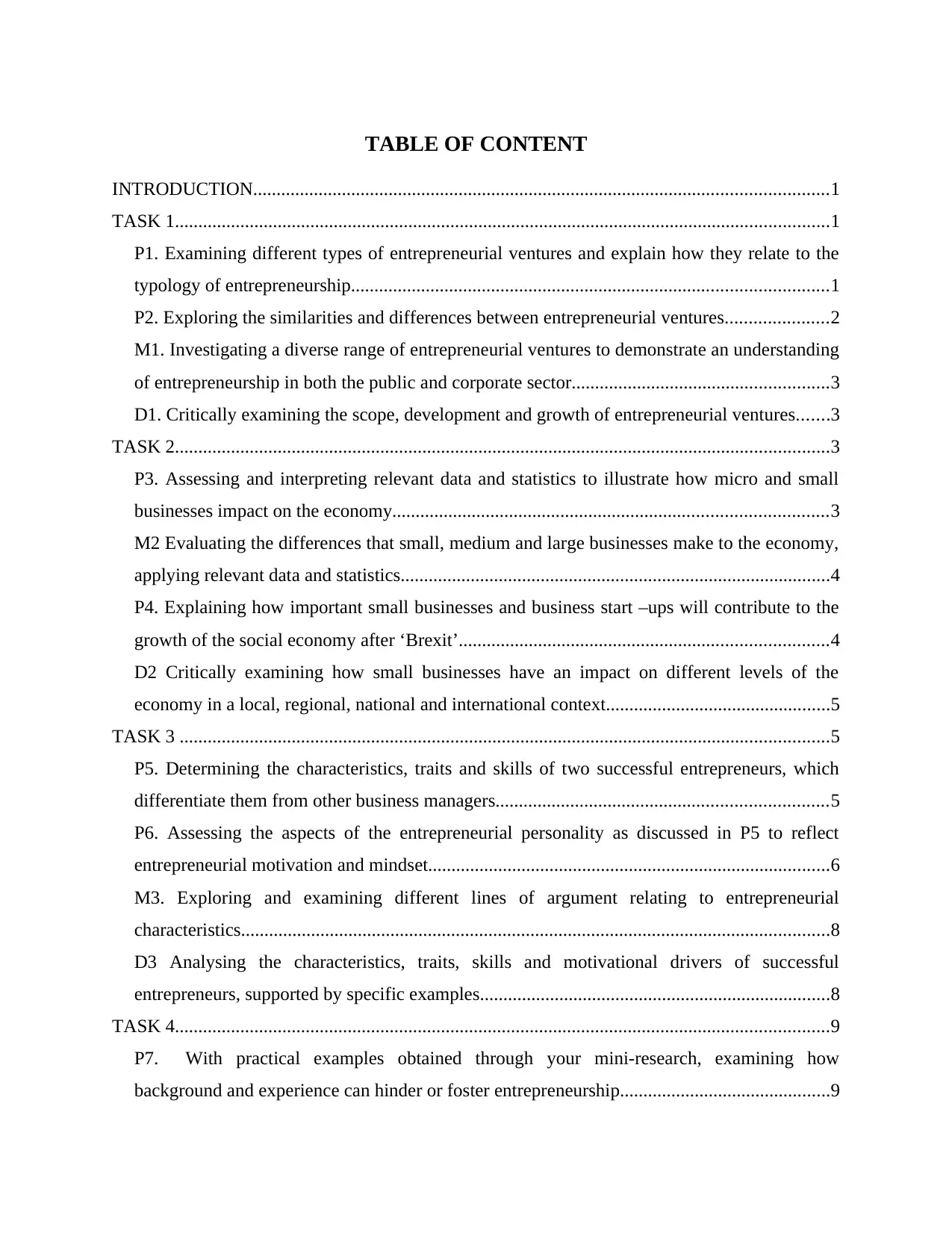
TABLE OF CONTENT
INTRODUCTION...........................................................................................................................1
TASK 1............................................................................................................................................1
P1. Examining different types of entrepreneurial ventures and explain how they relate to the
typology of entrepreneurship......................................................................................................1
P2. Exploring the similarities and differences between entrepreneurial ventures......................2
M1. Investigating a diverse range of entrepreneurial ventures to demonstrate an understanding
of entrepreneurship in both the public and corporate sector.......................................................3
D1. Critically examining the scope, development and growth of entrepreneurial ventures.......3
TASK 2............................................................................................................................................3
P3. Assessing and interpreting relevant data and statistics to illustrate how micro and small
businesses impact on the economy.............................................................................................3
M2 Evaluating the differences that small, medium and large businesses make to the economy,
applying relevant data and statistics............................................................................................4
P4. Explaining how important small businesses and business start –ups will contribute to the
growth of the social economy after ‘Brexit’...............................................................................4
D2 Critically examining how small businesses have an impact on different levels of the
economy in a local, regional, national and international context................................................5
TASK 3 ...........................................................................................................................................5
P5. Determining the characteristics, traits and skills of two successful entrepreneurs, which
differentiate them from other business managers.......................................................................5
P6. Assessing the aspects of the entrepreneurial personality as discussed in P5 to reflect
entrepreneurial motivation and mindset......................................................................................6
M3. Exploring and examining different lines of argument relating to entrepreneurial
characteristics..............................................................................................................................8
D3 Analysing the characteristics, traits, skills and motivational drivers of successful
entrepreneurs, supported by specific examples...........................................................................8
TASK 4............................................................................................................................................9
P7. With practical examples obtained through your mini-research, examining how
background and experience can hinder or foster entrepreneurship.............................................9
INTRODUCTION...........................................................................................................................1
TASK 1............................................................................................................................................1
P1. Examining different types of entrepreneurial ventures and explain how they relate to the
typology of entrepreneurship......................................................................................................1
P2. Exploring the similarities and differences between entrepreneurial ventures......................2
M1. Investigating a diverse range of entrepreneurial ventures to demonstrate an understanding
of entrepreneurship in both the public and corporate sector.......................................................3
D1. Critically examining the scope, development and growth of entrepreneurial ventures.......3
TASK 2............................................................................................................................................3
P3. Assessing and interpreting relevant data and statistics to illustrate how micro and small
businesses impact on the economy.............................................................................................3
M2 Evaluating the differences that small, medium and large businesses make to the economy,
applying relevant data and statistics............................................................................................4
P4. Explaining how important small businesses and business start –ups will contribute to the
growth of the social economy after ‘Brexit’...............................................................................4
D2 Critically examining how small businesses have an impact on different levels of the
economy in a local, regional, national and international context................................................5
TASK 3 ...........................................................................................................................................5
P5. Determining the characteristics, traits and skills of two successful entrepreneurs, which
differentiate them from other business managers.......................................................................5
P6. Assessing the aspects of the entrepreneurial personality as discussed in P5 to reflect
entrepreneurial motivation and mindset......................................................................................6
M3. Exploring and examining different lines of argument relating to entrepreneurial
characteristics..............................................................................................................................8
D3 Analysing the characteristics, traits, skills and motivational drivers of successful
entrepreneurs, supported by specific examples...........................................................................8
TASK 4............................................................................................................................................9
P7. With practical examples obtained through your mini-research, examining how
background and experience can hinder or foster entrepreneurship.............................................9

M4 Linking the entrepreneurial characteristics and the influence of personal background and
experience to specific successful entrepreneurs..........................................................................9
D4 Critically evaluating the way in which background and experience influences
entrepreneurs, both positively and negatively, by comparing and contrasting examples.........10
CONCLUSION..............................................................................................................................10
REFERENCES..............................................................................................................................11
experience to specific successful entrepreneurs..........................................................................9
D4 Critically evaluating the way in which background and experience influences
entrepreneurs, both positively and negatively, by comparing and contrasting examples.........10
CONCLUSION..............................................................................................................................10
REFERENCES..............................................................................................................................11

Secure Best Marks with AI Grader
Need help grading? Try our AI Grader for instant feedback on your assignments.
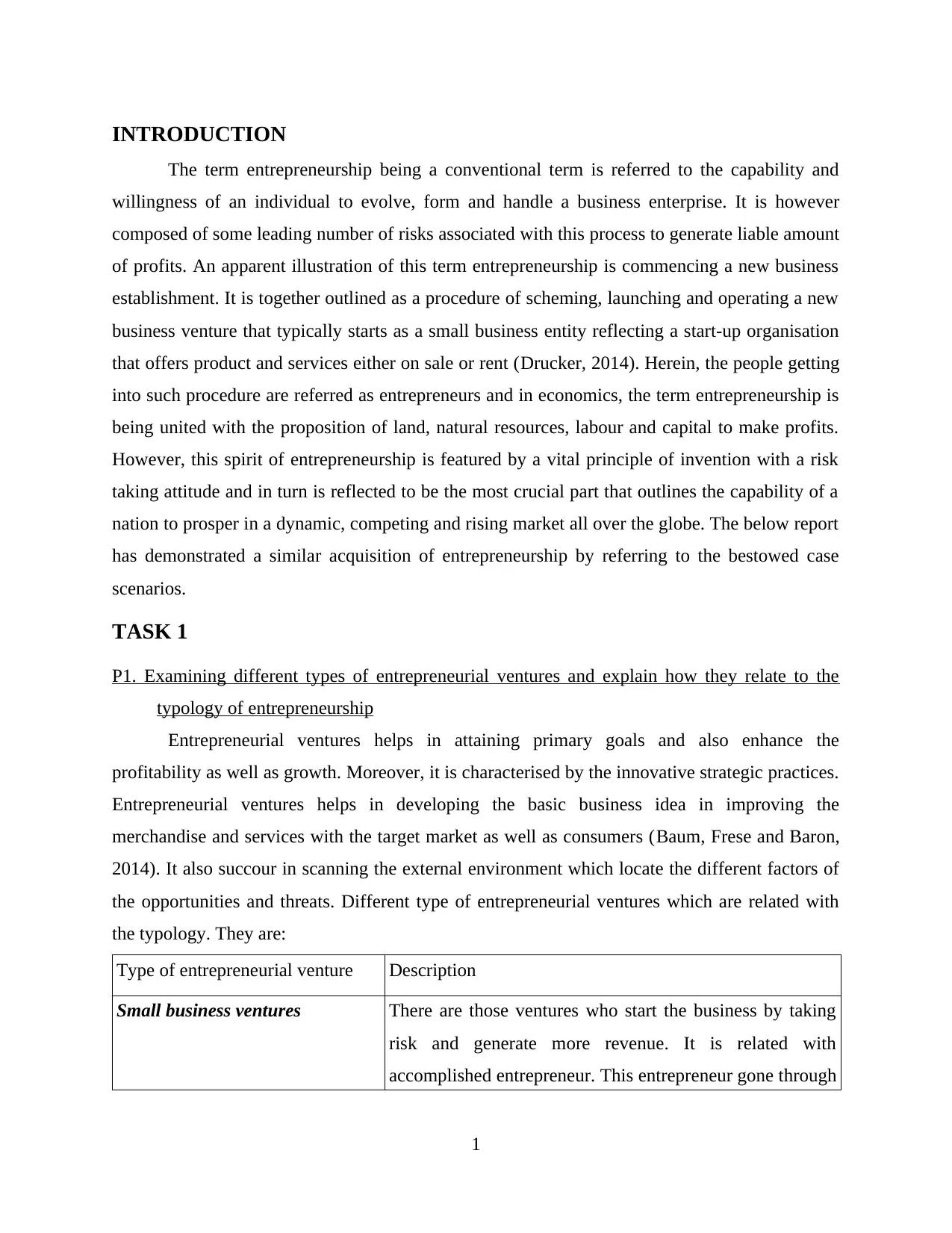
INTRODUCTION
The term entrepreneurship being a conventional term is referred to the capability and
willingness of an individual to evolve, form and handle a business enterprise. It is however
composed of some leading number of risks associated with this process to generate liable amount
of profits. An apparent illustration of this term entrepreneurship is commencing a new business
establishment. It is together outlined as a procedure of scheming, launching and operating a new
business venture that typically starts as a small business entity reflecting a start-up organisation
that offers product and services either on sale or rent (Drucker, 2014). Herein, the people getting
into such procedure are referred as entrepreneurs and in economics, the term entrepreneurship is
being united with the proposition of land, natural resources, labour and capital to make profits.
However, this spirit of entrepreneurship is featured by a vital principle of invention with a risk
taking attitude and in turn is reflected to be the most crucial part that outlines the capability of a
nation to prosper in a dynamic, competing and rising market all over the globe. The below report
has demonstrated a similar acquisition of entrepreneurship by referring to the bestowed case
scenarios.
TASK 1
P1. Examining different types of entrepreneurial ventures and explain how they relate to the
typology of entrepreneurship
Entrepreneurial ventures helps in attaining primary goals and also enhance the
profitability as well as growth. Moreover, it is characterised by the innovative strategic practices.
Entrepreneurial ventures helps in developing the basic business idea in improving the
merchandise and services with the target market as well as consumers (Baum, Frese and Baron,
2014). It also succour in scanning the external environment which locate the different factors of
the opportunities and threats. Different type of entrepreneurial ventures which are related with
the typology. They are:
Type of entrepreneurial venture Description
Small business ventures There are those ventures who start the business by taking
risk and generate more revenue. It is related with
accomplished entrepreneur. This entrepreneur gone through
1
The term entrepreneurship being a conventional term is referred to the capability and
willingness of an individual to evolve, form and handle a business enterprise. It is however
composed of some leading number of risks associated with this process to generate liable amount
of profits. An apparent illustration of this term entrepreneurship is commencing a new business
establishment. It is together outlined as a procedure of scheming, launching and operating a new
business venture that typically starts as a small business entity reflecting a start-up organisation
that offers product and services either on sale or rent (Drucker, 2014). Herein, the people getting
into such procedure are referred as entrepreneurs and in economics, the term entrepreneurship is
being united with the proposition of land, natural resources, labour and capital to make profits.
However, this spirit of entrepreneurship is featured by a vital principle of invention with a risk
taking attitude and in turn is reflected to be the most crucial part that outlines the capability of a
nation to prosper in a dynamic, competing and rising market all over the globe. The below report
has demonstrated a similar acquisition of entrepreneurship by referring to the bestowed case
scenarios.
TASK 1
P1. Examining different types of entrepreneurial ventures and explain how they relate to the
typology of entrepreneurship
Entrepreneurial ventures helps in attaining primary goals and also enhance the
profitability as well as growth. Moreover, it is characterised by the innovative strategic practices.
Entrepreneurial ventures helps in developing the basic business idea in improving the
merchandise and services with the target market as well as consumers (Baum, Frese and Baron,
2014). It also succour in scanning the external environment which locate the different factors of
the opportunities and threats. Different type of entrepreneurial ventures which are related with
the typology. They are:
Type of entrepreneurial venture Description
Small business ventures There are those ventures who start the business by taking
risk and generate more revenue. It is related with
accomplished entrepreneur. This entrepreneur gone through
1
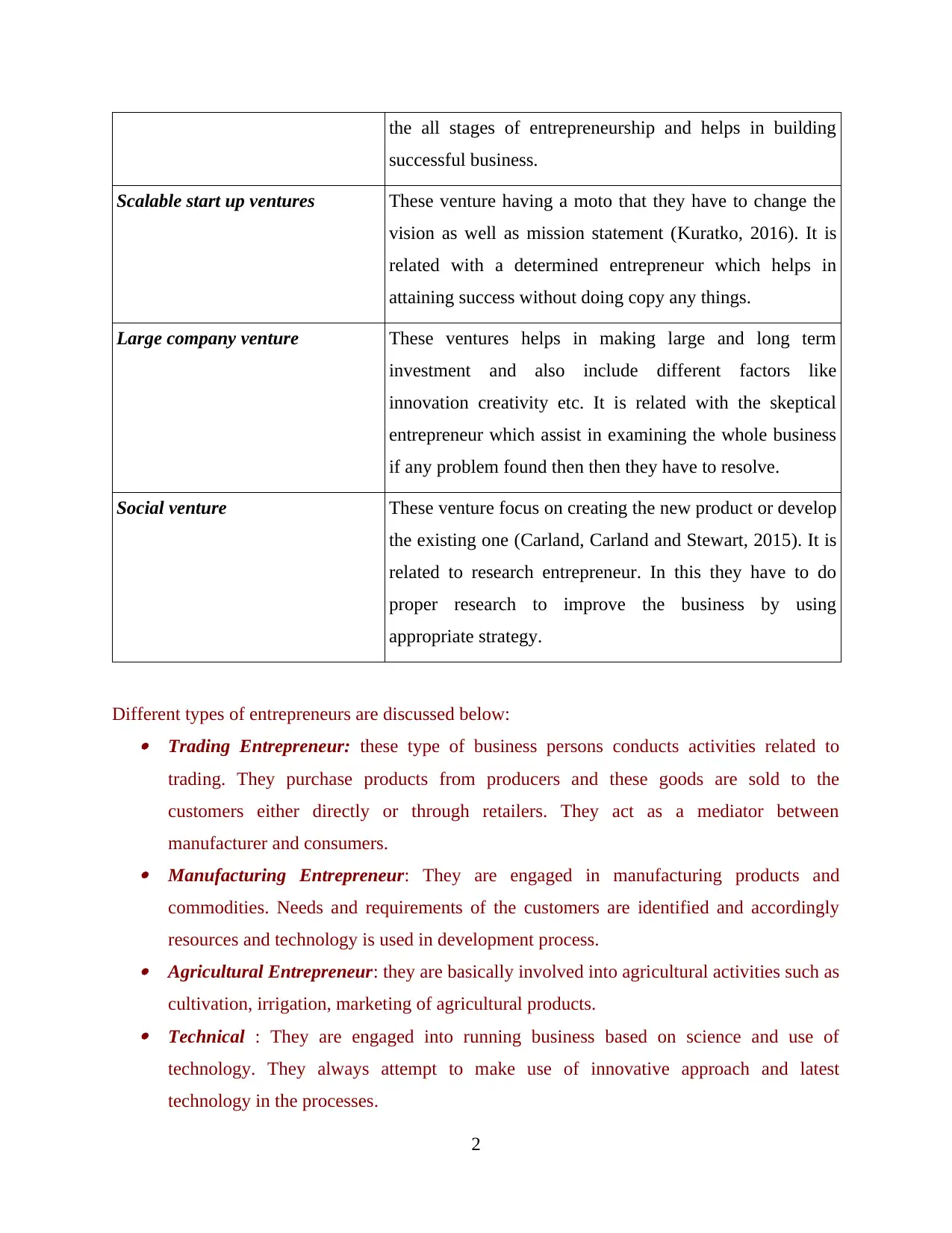
the all stages of entrepreneurship and helps in building
successful business.
Scalable start up ventures These venture having a moto that they have to change the
vision as well as mission statement (Kuratko, 2016). It is
related with a determined entrepreneur which helps in
attaining success without doing copy any things.
Large company venture These ventures helps in making large and long term
investment and also include different factors like
innovation creativity etc. It is related with the skeptical
entrepreneur which assist in examining the whole business
if any problem found then then they have to resolve.
Social venture These venture focus on creating the new product or develop
the existing one (Carland, Carland and Stewart, 2015). It is
related to research entrepreneur. In this they have to do
proper research to improve the business by using
appropriate strategy.
Different types of entrepreneurs are discussed below: Trading Entrepreneur: these type of business persons conducts activities related to
trading. They purchase products from producers and these goods are sold to the
customers either directly or through retailers. They act as a mediator between
manufacturer and consumers. Manufacturing Entrepreneur: They are engaged in manufacturing products and
commodities. Needs and requirements of the customers are identified and accordingly
resources and technology is used in development process. Agricultural Entrepreneur: they are basically involved into agricultural activities such as
cultivation, irrigation, marketing of agricultural products. Technical : They are engaged into running business based on science and use of
technology. They always attempt to make use of innovative approach and latest
technology in the processes.
2
successful business.
Scalable start up ventures These venture having a moto that they have to change the
vision as well as mission statement (Kuratko, 2016). It is
related with a determined entrepreneur which helps in
attaining success without doing copy any things.
Large company venture These ventures helps in making large and long term
investment and also include different factors like
innovation creativity etc. It is related with the skeptical
entrepreneur which assist in examining the whole business
if any problem found then then they have to resolve.
Social venture These venture focus on creating the new product or develop
the existing one (Carland, Carland and Stewart, 2015). It is
related to research entrepreneur. In this they have to do
proper research to improve the business by using
appropriate strategy.
Different types of entrepreneurs are discussed below: Trading Entrepreneur: these type of business persons conducts activities related to
trading. They purchase products from producers and these goods are sold to the
customers either directly or through retailers. They act as a mediator between
manufacturer and consumers. Manufacturing Entrepreneur: They are engaged in manufacturing products and
commodities. Needs and requirements of the customers are identified and accordingly
resources and technology is used in development process. Agricultural Entrepreneur: they are basically involved into agricultural activities such as
cultivation, irrigation, marketing of agricultural products. Technical : They are engaged into running business based on science and use of
technology. They always attempt to make use of innovative approach and latest
technology in the processes.
2
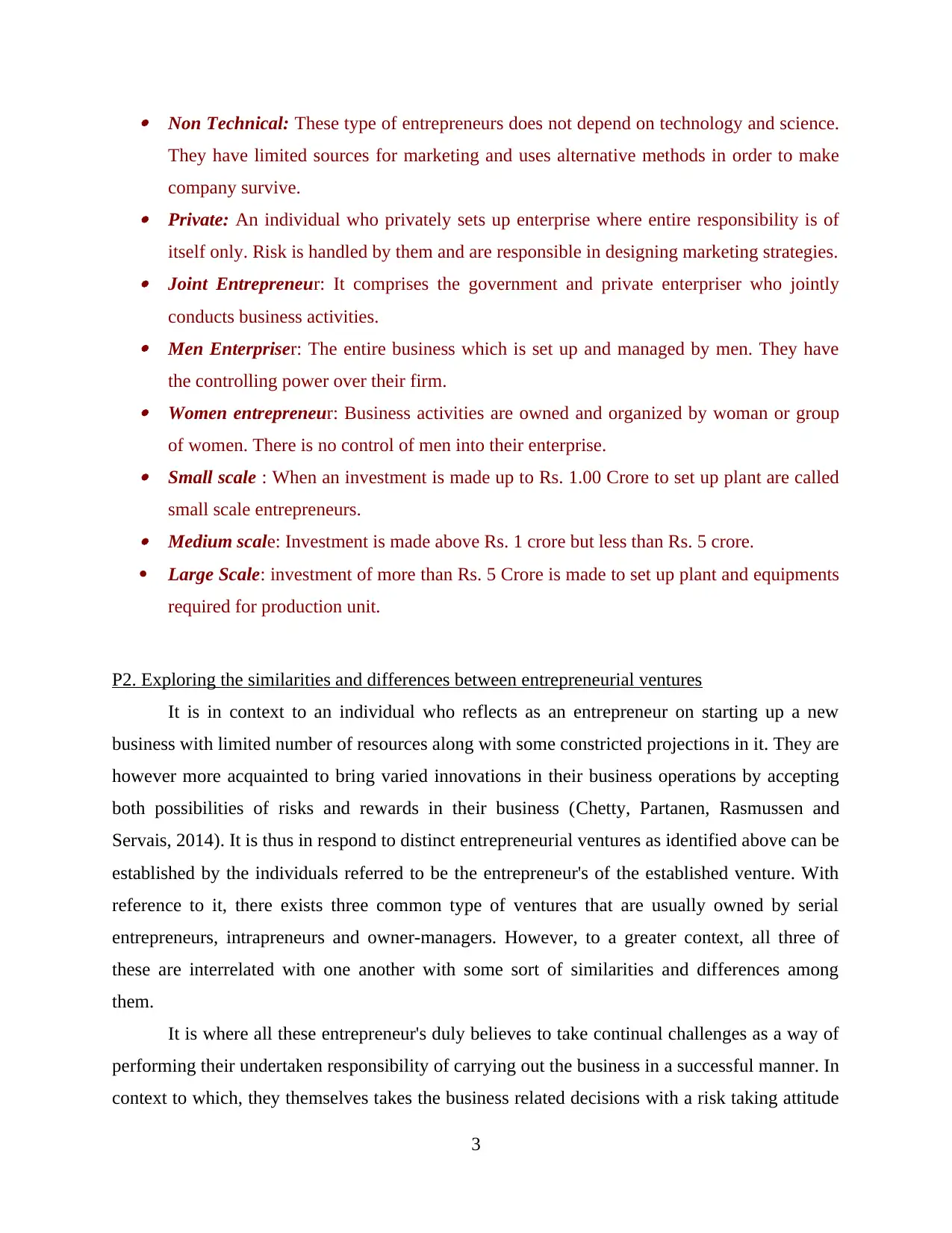
Non Technical: These type of entrepreneurs does not depend on technology and science.
They have limited sources for marketing and uses alternative methods in order to make
company survive. Private: An individual who privately sets up enterprise where entire responsibility is of
itself only. Risk is handled by them and are responsible in designing marketing strategies. Joint Entrepreneur: It comprises the government and private enterpriser who jointly
conducts business activities. Men Enterpriser: The entire business which is set up and managed by men. They have
the controlling power over their firm. Women entrepreneur: Business activities are owned and organized by woman or group
of women. There is no control of men into their enterprise. Small scale : When an investment is made up to Rs. 1.00 Crore to set up plant are called
small scale entrepreneurs. Medium scale: Investment is made above Rs. 1 crore but less than Rs. 5 crore.
Large Scale: investment of more than Rs. 5 Crore is made to set up plant and equipments
required for production unit.
P2. Exploring the similarities and differences between entrepreneurial ventures
It is in context to an individual who reflects as an entrepreneur on starting up a new
business with limited number of resources along with some constricted projections in it. They are
however more acquainted to bring varied innovations in their business operations by accepting
both possibilities of risks and rewards in their business (Chetty, Partanen, Rasmussen and
Servais, 2014). It is thus in respond to distinct entrepreneurial ventures as identified above can be
established by the individuals referred to be the entrepreneur's of the established venture. With
reference to it, there exists three common type of ventures that are usually owned by serial
entrepreneurs, intrapreneurs and owner-managers. However, to a greater context, all three of
these are interrelated with one another with some sort of similarities and differences among
them.
It is where all these entrepreneur's duly believes to take continual challenges as a way of
performing their undertaken responsibility of carrying out the business in a successful manner. In
context to which, they themselves takes the business related decisions with a risk taking attitude
3
They have limited sources for marketing and uses alternative methods in order to make
company survive. Private: An individual who privately sets up enterprise where entire responsibility is of
itself only. Risk is handled by them and are responsible in designing marketing strategies. Joint Entrepreneur: It comprises the government and private enterpriser who jointly
conducts business activities. Men Enterpriser: The entire business which is set up and managed by men. They have
the controlling power over their firm. Women entrepreneur: Business activities are owned and organized by woman or group
of women. There is no control of men into their enterprise. Small scale : When an investment is made up to Rs. 1.00 Crore to set up plant are called
small scale entrepreneurs. Medium scale: Investment is made above Rs. 1 crore but less than Rs. 5 crore.
Large Scale: investment of more than Rs. 5 Crore is made to set up plant and equipments
required for production unit.
P2. Exploring the similarities and differences between entrepreneurial ventures
It is in context to an individual who reflects as an entrepreneur on starting up a new
business with limited number of resources along with some constricted projections in it. They are
however more acquainted to bring varied innovations in their business operations by accepting
both possibilities of risks and rewards in their business (Chetty, Partanen, Rasmussen and
Servais, 2014). It is thus in respond to distinct entrepreneurial ventures as identified above can be
established by the individuals referred to be the entrepreneur's of the established venture. With
reference to it, there exists three common type of ventures that are usually owned by serial
entrepreneurs, intrapreneurs and owner-managers. However, to a greater context, all three of
these are interrelated with one another with some sort of similarities and differences among
them.
It is where all these entrepreneur's duly believes to take continual challenges as a way of
performing their undertaken responsibility of carrying out the business in a successful manner. In
context to which, they themselves takes the business related decisions with a risk taking attitude
3
Paraphrase This Document
Need a fresh take? Get an instant paraphrase of this document with our AI Paraphraser
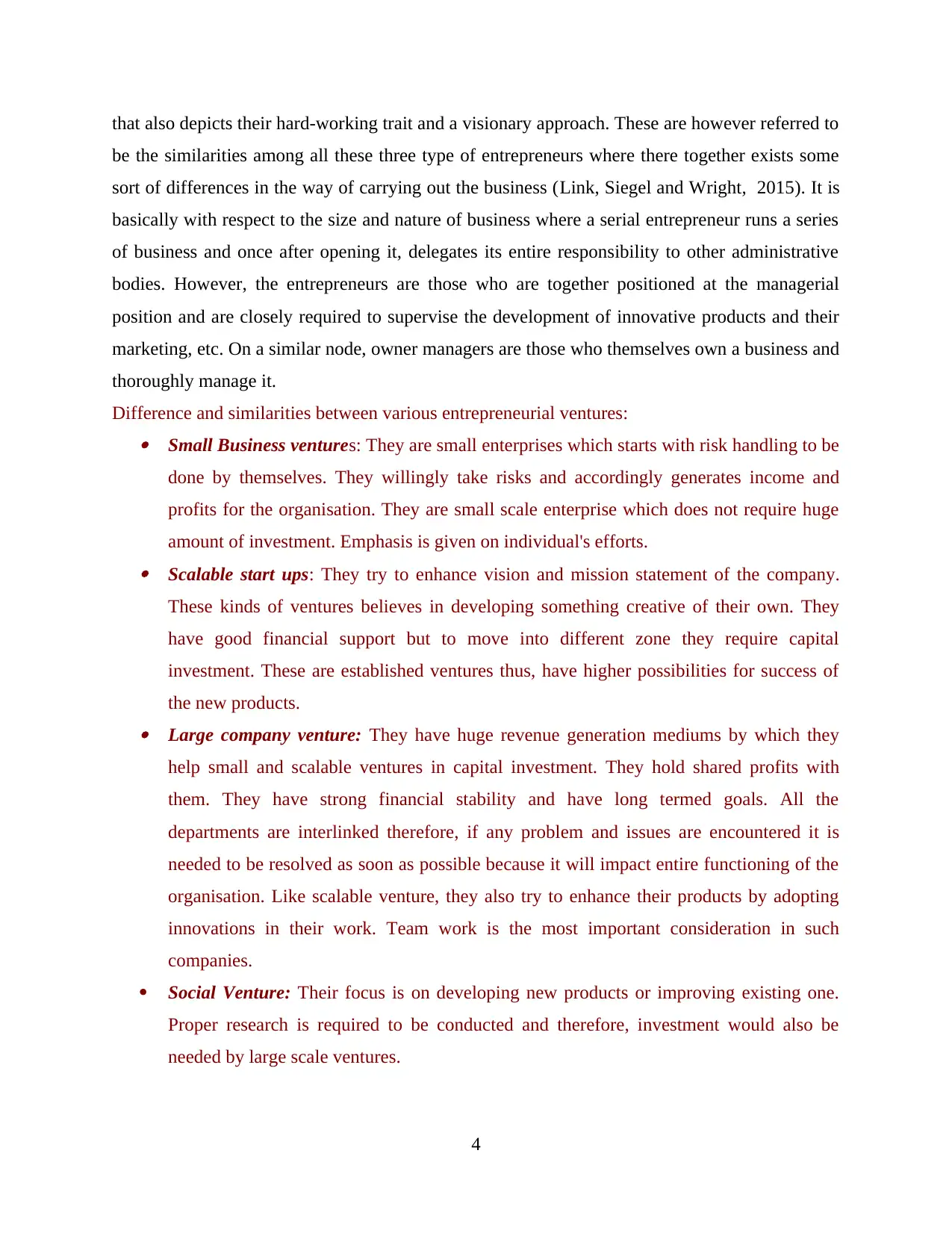
that also depicts their hard-working trait and a visionary approach. These are however referred to
be the similarities among all these three type of entrepreneurs where there together exists some
sort of differences in the way of carrying out the business (Link, Siegel and Wright, 2015). It is
basically with respect to the size and nature of business where a serial entrepreneur runs a series
of business and once after opening it, delegates its entire responsibility to other administrative
bodies. However, the entrepreneurs are those who are together positioned at the managerial
position and are closely required to supervise the development of innovative products and their
marketing, etc. On a similar node, owner managers are those who themselves own a business and
thoroughly manage it.
Difference and similarities between various entrepreneurial ventures: Small Business ventures: They are small enterprises which starts with risk handling to be
done by themselves. They willingly take risks and accordingly generates income and
profits for the organisation. They are small scale enterprise which does not require huge
amount of investment. Emphasis is given on individual's efforts. Scalable start ups: They try to enhance vision and mission statement of the company.
These kinds of ventures believes in developing something creative of their own. They
have good financial support but to move into different zone they require capital
investment. These are established ventures thus, have higher possibilities for success of
the new products. Large company venture: They have huge revenue generation mediums by which they
help small and scalable ventures in capital investment. They hold shared profits with
them. They have strong financial stability and have long termed goals. All the
departments are interlinked therefore, if any problem and issues are encountered it is
needed to be resolved as soon as possible because it will impact entire functioning of the
organisation. Like scalable venture, they also try to enhance their products by adopting
innovations in their work. Team work is the most important consideration in such
companies.
Social Venture: Their focus is on developing new products or improving existing one.
Proper research is required to be conducted and therefore, investment would also be
needed by large scale ventures.
4
be the similarities among all these three type of entrepreneurs where there together exists some
sort of differences in the way of carrying out the business (Link, Siegel and Wright, 2015). It is
basically with respect to the size and nature of business where a serial entrepreneur runs a series
of business and once after opening it, delegates its entire responsibility to other administrative
bodies. However, the entrepreneurs are those who are together positioned at the managerial
position and are closely required to supervise the development of innovative products and their
marketing, etc. On a similar node, owner managers are those who themselves own a business and
thoroughly manage it.
Difference and similarities between various entrepreneurial ventures: Small Business ventures: They are small enterprises which starts with risk handling to be
done by themselves. They willingly take risks and accordingly generates income and
profits for the organisation. They are small scale enterprise which does not require huge
amount of investment. Emphasis is given on individual's efforts. Scalable start ups: They try to enhance vision and mission statement of the company.
These kinds of ventures believes in developing something creative of their own. They
have good financial support but to move into different zone they require capital
investment. These are established ventures thus, have higher possibilities for success of
the new products. Large company venture: They have huge revenue generation mediums by which they
help small and scalable ventures in capital investment. They hold shared profits with
them. They have strong financial stability and have long termed goals. All the
departments are interlinked therefore, if any problem and issues are encountered it is
needed to be resolved as soon as possible because it will impact entire functioning of the
organisation. Like scalable venture, they also try to enhance their products by adopting
innovations in their work. Team work is the most important consideration in such
companies.
Social Venture: Their focus is on developing new products or improving existing one.
Proper research is required to be conducted and therefore, investment would also be
needed by large scale ventures.
4
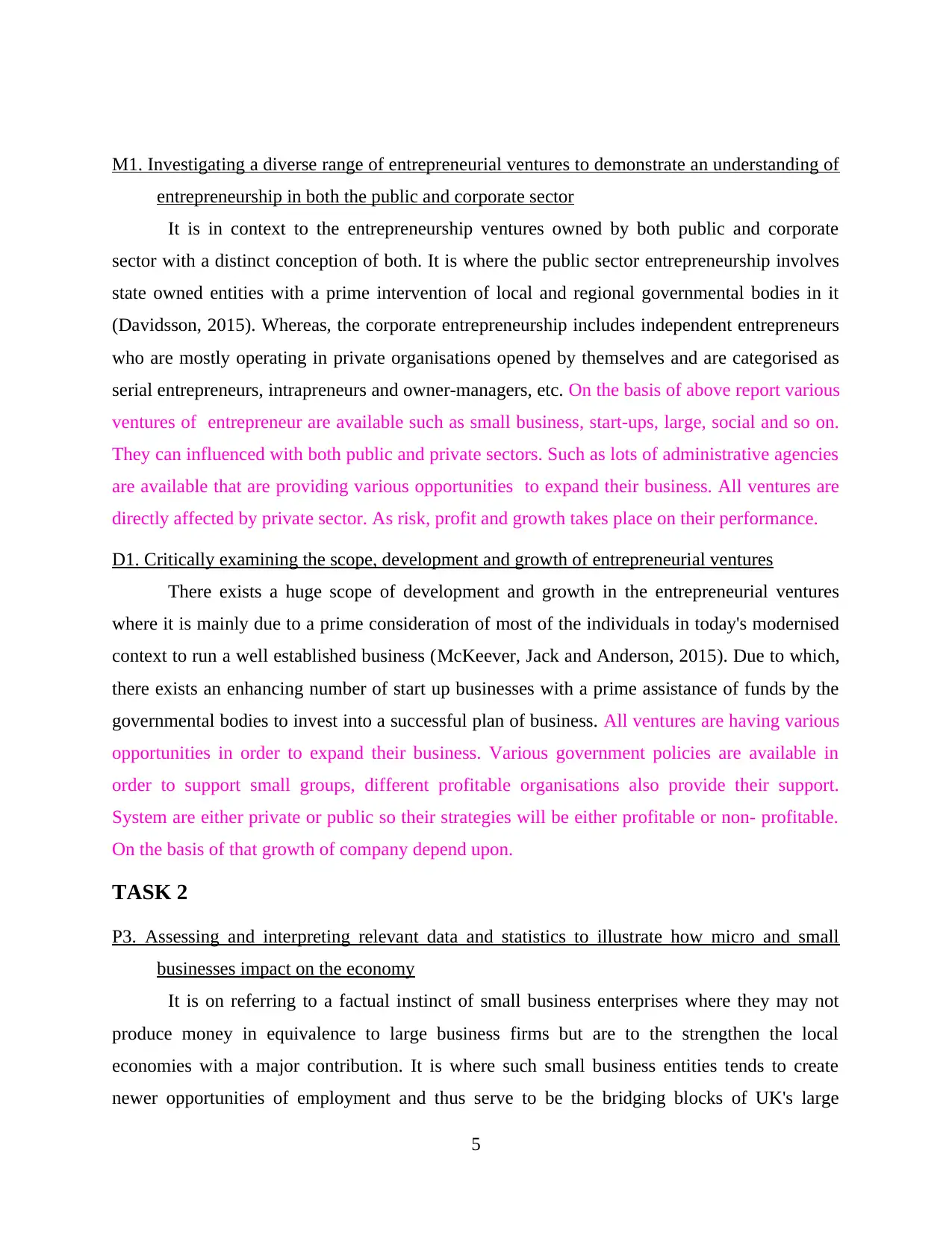
M1. Investigating a diverse range of entrepreneurial ventures to demonstrate an understanding of
entrepreneurship in both the public and corporate sector
It is in context to the entrepreneurship ventures owned by both public and corporate
sector with a distinct conception of both. It is where the public sector entrepreneurship involves
state owned entities with a prime intervention of local and regional governmental bodies in it
(Davidsson, 2015). Whereas, the corporate entrepreneurship includes independent entrepreneurs
who are mostly operating in private organisations opened by themselves and are categorised as
serial entrepreneurs, intrapreneurs and owner-managers, etc. On the basis of above report various
ventures of entrepreneur are available such as small business, start-ups, large, social and so on.
They can influenced with both public and private sectors. Such as lots of administrative agencies
are available that are providing various opportunities to expand their business. All ventures are
directly affected by private sector. As risk, profit and growth takes place on their performance.
D1. Critically examining the scope, development and growth of entrepreneurial ventures
There exists a huge scope of development and growth in the entrepreneurial ventures
where it is mainly due to a prime consideration of most of the individuals in today's modernised
context to run a well established business (McKeever, Jack and Anderson, 2015). Due to which,
there exists an enhancing number of start up businesses with a prime assistance of funds by the
governmental bodies to invest into a successful plan of business. All ventures are having various
opportunities in order to expand their business. Various government policies are available in
order to support small groups, different profitable organisations also provide their support.
System are either private or public so their strategies will be either profitable or non- profitable.
On the basis of that growth of company depend upon.
TASK 2
P3. Assessing and interpreting relevant data and statistics to illustrate how micro and small
businesses impact on the economy
It is on referring to a factual instinct of small business enterprises where they may not
produce money in equivalence to large business firms but are to the strengthen the local
economies with a major contribution. It is where such small business entities tends to create
newer opportunities of employment and thus serve to be the bridging blocks of UK's large
5
entrepreneurship in both the public and corporate sector
It is in context to the entrepreneurship ventures owned by both public and corporate
sector with a distinct conception of both. It is where the public sector entrepreneurship involves
state owned entities with a prime intervention of local and regional governmental bodies in it
(Davidsson, 2015). Whereas, the corporate entrepreneurship includes independent entrepreneurs
who are mostly operating in private organisations opened by themselves and are categorised as
serial entrepreneurs, intrapreneurs and owner-managers, etc. On the basis of above report various
ventures of entrepreneur are available such as small business, start-ups, large, social and so on.
They can influenced with both public and private sectors. Such as lots of administrative agencies
are available that are providing various opportunities to expand their business. All ventures are
directly affected by private sector. As risk, profit and growth takes place on their performance.
D1. Critically examining the scope, development and growth of entrepreneurial ventures
There exists a huge scope of development and growth in the entrepreneurial ventures
where it is mainly due to a prime consideration of most of the individuals in today's modernised
context to run a well established business (McKeever, Jack and Anderson, 2015). Due to which,
there exists an enhancing number of start up businesses with a prime assistance of funds by the
governmental bodies to invest into a successful plan of business. All ventures are having various
opportunities in order to expand their business. Various government policies are available in
order to support small groups, different profitable organisations also provide their support.
System are either private or public so their strategies will be either profitable or non- profitable.
On the basis of that growth of company depend upon.
TASK 2
P3. Assessing and interpreting relevant data and statistics to illustrate how micro and small
businesses impact on the economy
It is on referring to a factual instinct of small business enterprises where they may not
produce money in equivalence to large business firms but are to the strengthen the local
economies with a major contribution. It is where such small business entities tends to create
newer opportunities of employment and thus serve to be the bridging blocks of UK's large
5
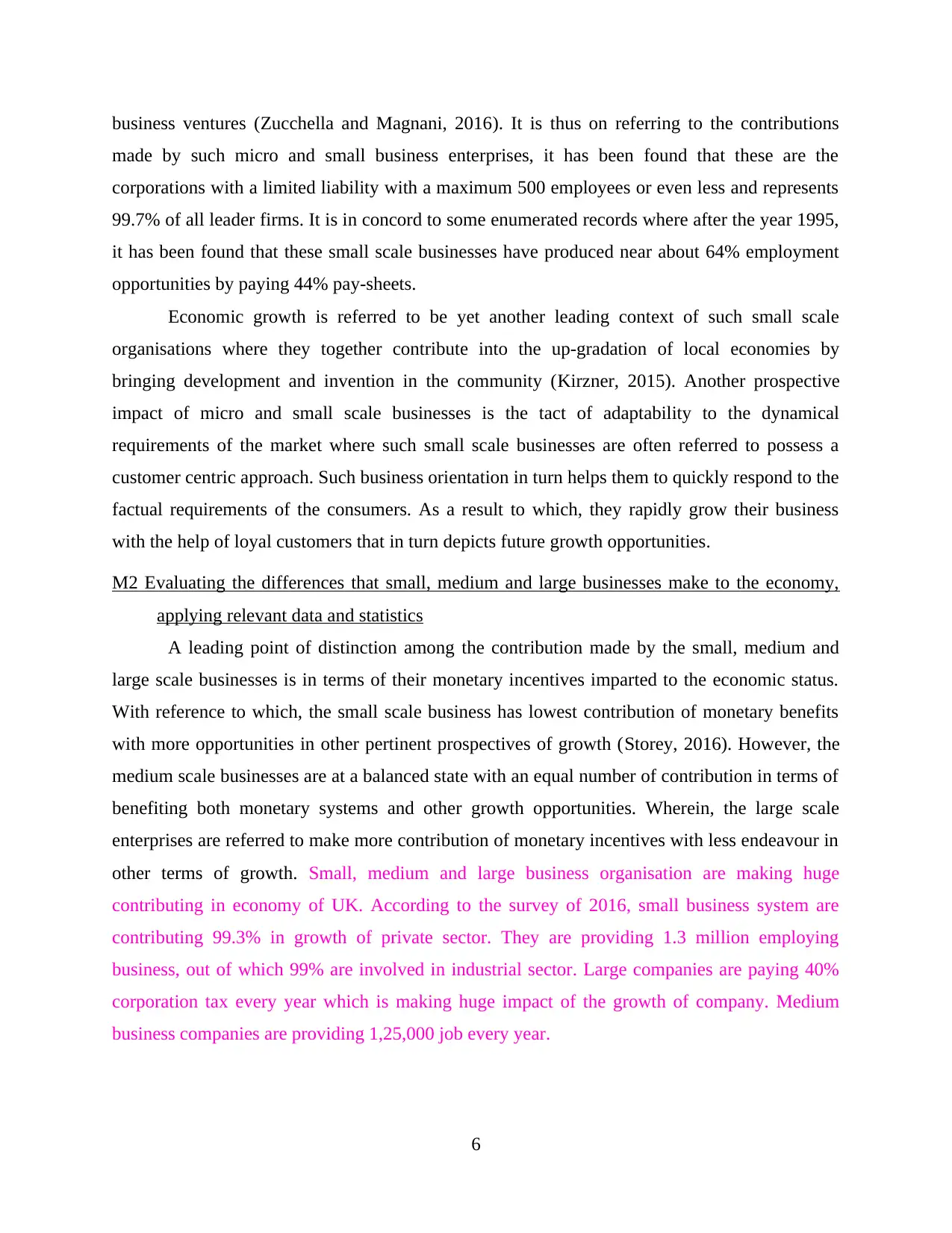
business ventures (Zucchella and Magnani, 2016). It is thus on referring to the contributions
made by such micro and small business enterprises, it has been found that these are the
corporations with a limited liability with a maximum 500 employees or even less and represents
99.7% of all leader firms. It is in concord to some enumerated records where after the year 1995,
it has been found that these small scale businesses have produced near about 64% employment
opportunities by paying 44% pay-sheets.
Economic growth is referred to be yet another leading context of such small scale
organisations where they together contribute into the up-gradation of local economies by
bringing development and invention in the community (Kirzner, 2015). Another prospective
impact of micro and small scale businesses is the tact of adaptability to the dynamical
requirements of the market where such small scale businesses are often referred to possess a
customer centric approach. Such business orientation in turn helps them to quickly respond to the
factual requirements of the consumers. As a result to which, they rapidly grow their business
with the help of loyal customers that in turn depicts future growth opportunities.
M2 Evaluating the differences that small, medium and large businesses make to the economy,
applying relevant data and statistics
A leading point of distinction among the contribution made by the small, medium and
large scale businesses is in terms of their monetary incentives imparted to the economic status.
With reference to which, the small scale business has lowest contribution of monetary benefits
with more opportunities in other pertinent prospectives of growth (Storey, 2016). However, the
medium scale businesses are at a balanced state with an equal number of contribution in terms of
benefiting both monetary systems and other growth opportunities. Wherein, the large scale
enterprises are referred to make more contribution of monetary incentives with less endeavour in
other terms of growth. Small, medium and large business organisation are making huge
contributing in economy of UK. According to the survey of 2016, small business system are
contributing 99.3% in growth of private sector. They are providing 1.3 million employing
business, out of which 99% are involved in industrial sector. Large companies are paying 40%
corporation tax every year which is making huge impact of the growth of company. Medium
business companies are providing 1,25,000 job every year.
6
made by such micro and small business enterprises, it has been found that these are the
corporations with a limited liability with a maximum 500 employees or even less and represents
99.7% of all leader firms. It is in concord to some enumerated records where after the year 1995,
it has been found that these small scale businesses have produced near about 64% employment
opportunities by paying 44% pay-sheets.
Economic growth is referred to be yet another leading context of such small scale
organisations where they together contribute into the up-gradation of local economies by
bringing development and invention in the community (Kirzner, 2015). Another prospective
impact of micro and small scale businesses is the tact of adaptability to the dynamical
requirements of the market where such small scale businesses are often referred to possess a
customer centric approach. Such business orientation in turn helps them to quickly respond to the
factual requirements of the consumers. As a result to which, they rapidly grow their business
with the help of loyal customers that in turn depicts future growth opportunities.
M2 Evaluating the differences that small, medium and large businesses make to the economy,
applying relevant data and statistics
A leading point of distinction among the contribution made by the small, medium and
large scale businesses is in terms of their monetary incentives imparted to the economic status.
With reference to which, the small scale business has lowest contribution of monetary benefits
with more opportunities in other pertinent prospectives of growth (Storey, 2016). However, the
medium scale businesses are at a balanced state with an equal number of contribution in terms of
benefiting both monetary systems and other growth opportunities. Wherein, the large scale
enterprises are referred to make more contribution of monetary incentives with less endeavour in
other terms of growth. Small, medium and large business organisation are making huge
contributing in economy of UK. According to the survey of 2016, small business system are
contributing 99.3% in growth of private sector. They are providing 1.3 million employing
business, out of which 99% are involved in industrial sector. Large companies are paying 40%
corporation tax every year which is making huge impact of the growth of company. Medium
business companies are providing 1,25,000 job every year.
6
Secure Best Marks with AI Grader
Need help grading? Try our AI Grader for instant feedback on your assignments.
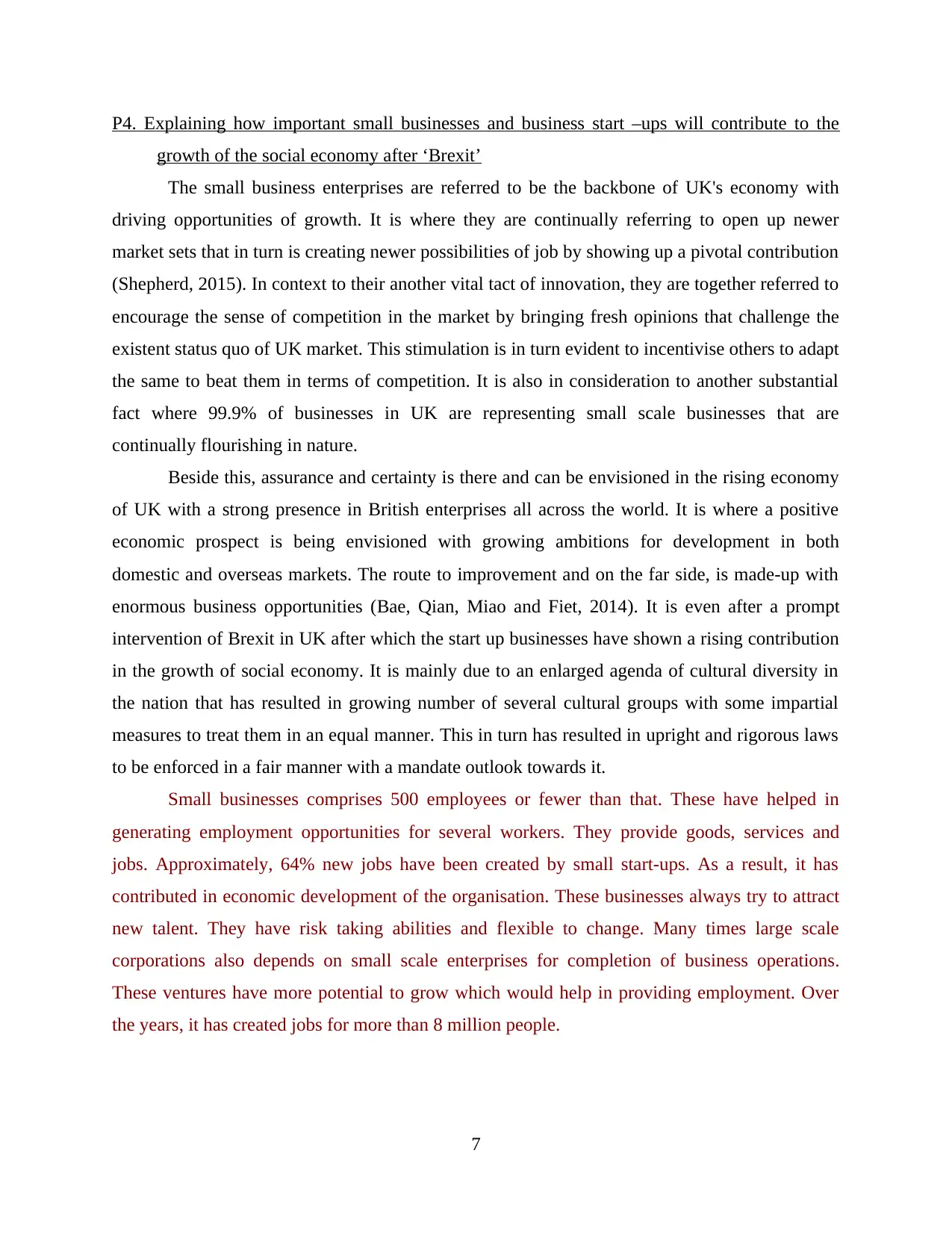
P4. Explaining how important small businesses and business start –ups will contribute to the
growth of the social economy after ‘Brexit’
The small business enterprises are referred to be the backbone of UK's economy with
driving opportunities of growth. It is where they are continually referring to open up newer
market sets that in turn is creating newer possibilities of job by showing up a pivotal contribution
(Shepherd, 2015). In context to their another vital tact of innovation, they are together referred to
encourage the sense of competition in the market by bringing fresh opinions that challenge the
existent status quo of UK market. This stimulation is in turn evident to incentivise others to adapt
the same to beat them in terms of competition. It is also in consideration to another substantial
fact where 99.9% of businesses in UK are representing small scale businesses that are
continually flourishing in nature.
Beside this, assurance and certainty is there and can be envisioned in the rising economy
of UK with a strong presence in British enterprises all across the world. It is where a positive
economic prospect is being envisioned with growing ambitions for development in both
domestic and overseas markets. The route to improvement and on the far side, is made-up with
enormous business opportunities (Bae, Qian, Miao and Fiet, 2014). It is even after a prompt
intervention of Brexit in UK after which the start up businesses have shown a rising contribution
in the growth of social economy. It is mainly due to an enlarged agenda of cultural diversity in
the nation that has resulted in growing number of several cultural groups with some impartial
measures to treat them in an equal manner. This in turn has resulted in upright and rigorous laws
to be enforced in a fair manner with a mandate outlook towards it.
Small businesses comprises 500 employees or fewer than that. These have helped in
generating employment opportunities for several workers. They provide goods, services and
jobs. Approximately, 64% new jobs have been created by small start-ups. As a result, it has
contributed in economic development of the organisation. These businesses always try to attract
new talent. They have risk taking abilities and flexible to change. Many times large scale
corporations also depends on small scale enterprises for completion of business operations.
These ventures have more potential to grow which would help in providing employment. Over
the years, it has created jobs for more than 8 million people.
7
growth of the social economy after ‘Brexit’
The small business enterprises are referred to be the backbone of UK's economy with
driving opportunities of growth. It is where they are continually referring to open up newer
market sets that in turn is creating newer possibilities of job by showing up a pivotal contribution
(Shepherd, 2015). In context to their another vital tact of innovation, they are together referred to
encourage the sense of competition in the market by bringing fresh opinions that challenge the
existent status quo of UK market. This stimulation is in turn evident to incentivise others to adapt
the same to beat them in terms of competition. It is also in consideration to another substantial
fact where 99.9% of businesses in UK are representing small scale businesses that are
continually flourishing in nature.
Beside this, assurance and certainty is there and can be envisioned in the rising economy
of UK with a strong presence in British enterprises all across the world. It is where a positive
economic prospect is being envisioned with growing ambitions for development in both
domestic and overseas markets. The route to improvement and on the far side, is made-up with
enormous business opportunities (Bae, Qian, Miao and Fiet, 2014). It is even after a prompt
intervention of Brexit in UK after which the start up businesses have shown a rising contribution
in the growth of social economy. It is mainly due to an enlarged agenda of cultural diversity in
the nation that has resulted in growing number of several cultural groups with some impartial
measures to treat them in an equal manner. This in turn has resulted in upright and rigorous laws
to be enforced in a fair manner with a mandate outlook towards it.
Small businesses comprises 500 employees or fewer than that. These have helped in
generating employment opportunities for several workers. They provide goods, services and
jobs. Approximately, 64% new jobs have been created by small start-ups. As a result, it has
contributed in economic development of the organisation. These businesses always try to attract
new talent. They have risk taking abilities and flexible to change. Many times large scale
corporations also depends on small scale enterprises for completion of business operations.
These ventures have more potential to grow which would help in providing employment. Over
the years, it has created jobs for more than 8 million people.
7
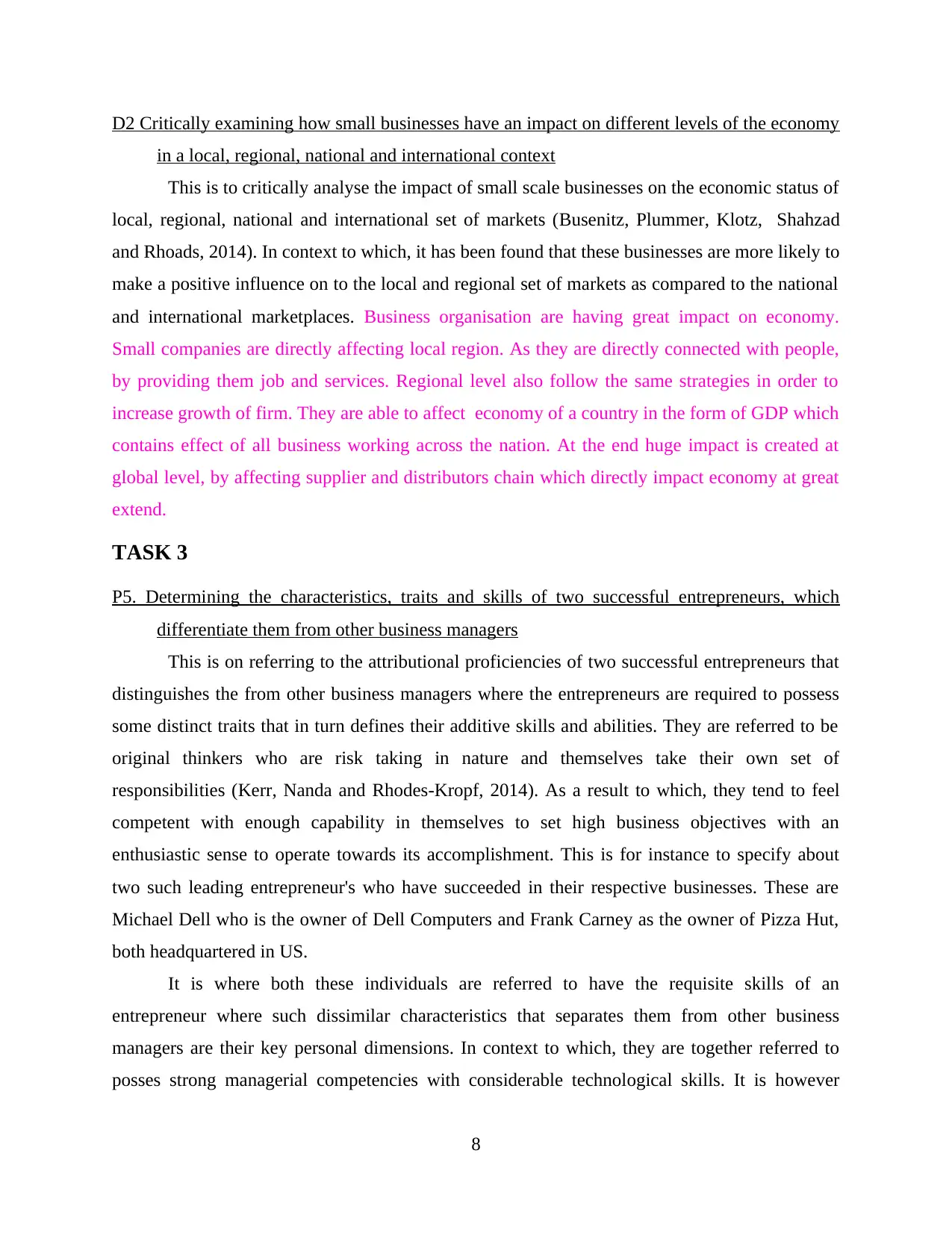
D2 Critically examining how small businesses have an impact on different levels of the economy
in a local, regional, national and international context
This is to critically analyse the impact of small scale businesses on the economic status of
local, regional, national and international set of markets (Busenitz, Plummer, Klotz, Shahzad
and Rhoads, 2014). In context to which, it has been found that these businesses are more likely to
make a positive influence on to the local and regional set of markets as compared to the national
and international marketplaces. Business organisation are having great impact on economy.
Small companies are directly affecting local region. As they are directly connected with people,
by providing them job and services. Regional level also follow the same strategies in order to
increase growth of firm. They are able to affect economy of a country in the form of GDP which
contains effect of all business working across the nation. At the end huge impact is created at
global level, by affecting supplier and distributors chain which directly impact economy at great
extend.
TASK 3
P5. Determining the characteristics, traits and skills of two successful entrepreneurs, which
differentiate them from other business managers
This is on referring to the attributional proficiencies of two successful entrepreneurs that
distinguishes the from other business managers where the entrepreneurs are required to possess
some distinct traits that in turn defines their additive skills and abilities. They are referred to be
original thinkers who are risk taking in nature and themselves take their own set of
responsibilities (Kerr, Nanda and Rhodes-Kropf, 2014). As a result to which, they tend to feel
competent with enough capability in themselves to set high business objectives with an
enthusiastic sense to operate towards its accomplishment. This is for instance to specify about
two such leading entrepreneur's who have succeeded in their respective businesses. These are
Michael Dell who is the owner of Dell Computers and Frank Carney as the owner of Pizza Hut,
both headquartered in US.
It is where both these individuals are referred to have the requisite skills of an
entrepreneur where such dissimilar characteristics that separates them from other business
managers are their key personal dimensions. In context to which, they are together referred to
posses strong managerial competencies with considerable technological skills. It is however
8
in a local, regional, national and international context
This is to critically analyse the impact of small scale businesses on the economic status of
local, regional, national and international set of markets (Busenitz, Plummer, Klotz, Shahzad
and Rhoads, 2014). In context to which, it has been found that these businesses are more likely to
make a positive influence on to the local and regional set of markets as compared to the national
and international marketplaces. Business organisation are having great impact on economy.
Small companies are directly affecting local region. As they are directly connected with people,
by providing them job and services. Regional level also follow the same strategies in order to
increase growth of firm. They are able to affect economy of a country in the form of GDP which
contains effect of all business working across the nation. At the end huge impact is created at
global level, by affecting supplier and distributors chain which directly impact economy at great
extend.
TASK 3
P5. Determining the characteristics, traits and skills of two successful entrepreneurs, which
differentiate them from other business managers
This is on referring to the attributional proficiencies of two successful entrepreneurs that
distinguishes the from other business managers where the entrepreneurs are required to possess
some distinct traits that in turn defines their additive skills and abilities. They are referred to be
original thinkers who are risk taking in nature and themselves take their own set of
responsibilities (Kerr, Nanda and Rhodes-Kropf, 2014). As a result to which, they tend to feel
competent with enough capability in themselves to set high business objectives with an
enthusiastic sense to operate towards its accomplishment. This is for instance to specify about
two such leading entrepreneur's who have succeeded in their respective businesses. These are
Michael Dell who is the owner of Dell Computers and Frank Carney as the owner of Pizza Hut,
both headquartered in US.
It is where both these individuals are referred to have the requisite skills of an
entrepreneur where such dissimilar characteristics that separates them from other business
managers are their key personal dimensions. In context to which, they are together referred to
posses strong managerial competencies with considerable technological skills. It is however
8
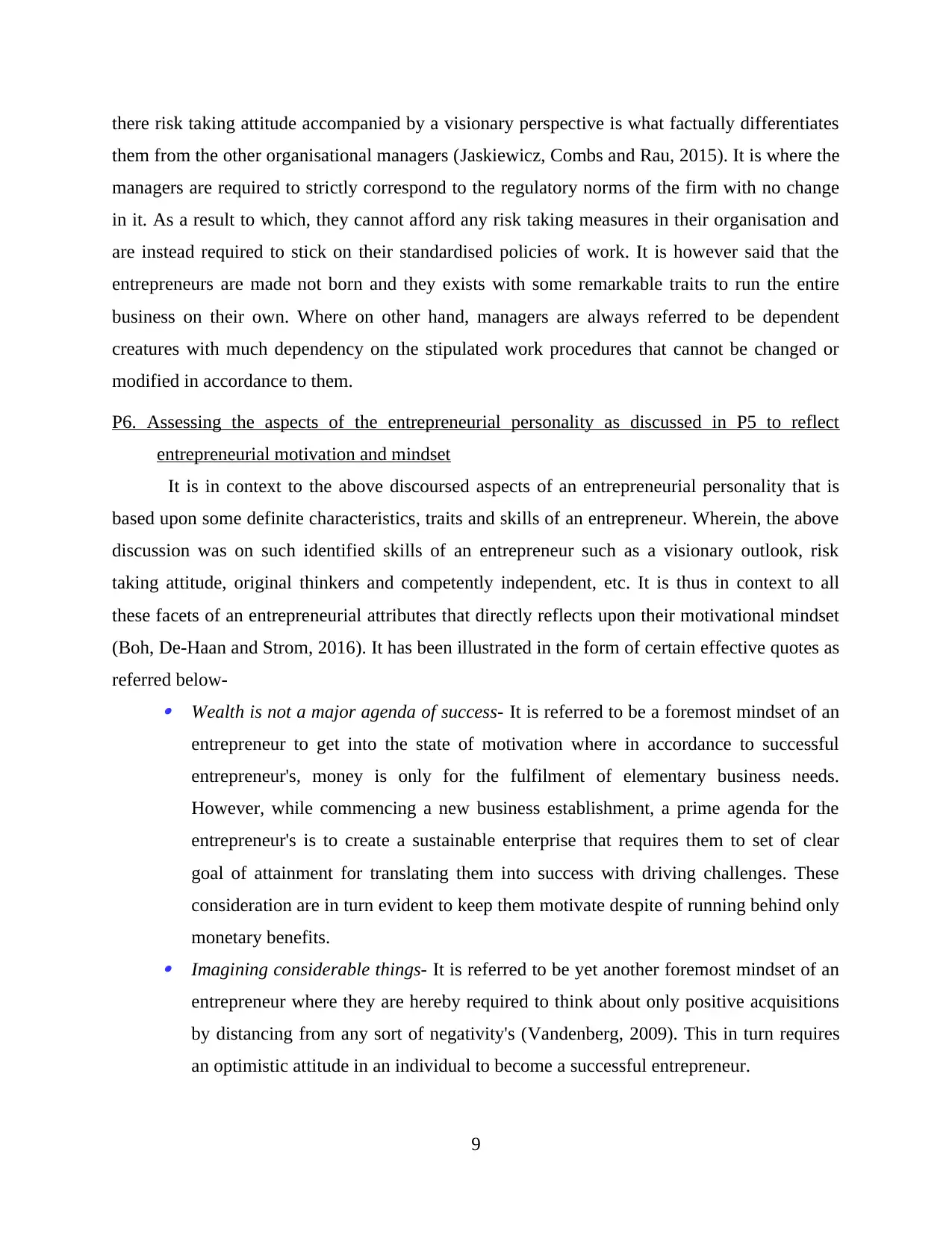
there risk taking attitude accompanied by a visionary perspective is what factually differentiates
them from the other organisational managers (Jaskiewicz, Combs and Rau, 2015). It is where the
managers are required to strictly correspond to the regulatory norms of the firm with no change
in it. As a result to which, they cannot afford any risk taking measures in their organisation and
are instead required to stick on their standardised policies of work. It is however said that the
entrepreneurs are made not born and they exists with some remarkable traits to run the entire
business on their own. Where on other hand, managers are always referred to be dependent
creatures with much dependency on the stipulated work procedures that cannot be changed or
modified in accordance to them.
P6. Assessing the aspects of the entrepreneurial personality as discussed in P5 to reflect
entrepreneurial motivation and mindset
It is in context to the above discoursed aspects of an entrepreneurial personality that is
based upon some definite characteristics, traits and skills of an entrepreneur. Wherein, the above
discussion was on such identified skills of an entrepreneur such as a visionary outlook, risk
taking attitude, original thinkers and competently independent, etc. It is thus in context to all
these facets of an entrepreneurial attributes that directly reflects upon their motivational mindset
(Boh, De-Haan and Strom, 2016). It has been illustrated in the form of certain effective quotes as
referred below-
Wealth is not a major agenda of success- It is referred to be a foremost mindset of an
entrepreneur to get into the state of motivation where in accordance to successful
entrepreneur's, money is only for the fulfilment of elementary business needs.
However, while commencing a new business establishment, a prime agenda for the
entrepreneur's is to create a sustainable enterprise that requires them to set of clear
goal of attainment for translating them into success with driving challenges. These
consideration are in turn evident to keep them motivate despite of running behind only
monetary benefits.
Imagining considerable things- It is referred to be yet another foremost mindset of an
entrepreneur where they are hereby required to think about only positive acquisitions
by distancing from any sort of negativity's (Vandenberg, 2009). This in turn requires
an optimistic attitude in an individual to become a successful entrepreneur.
9
them from the other organisational managers (Jaskiewicz, Combs and Rau, 2015). It is where the
managers are required to strictly correspond to the regulatory norms of the firm with no change
in it. As a result to which, they cannot afford any risk taking measures in their organisation and
are instead required to stick on their standardised policies of work. It is however said that the
entrepreneurs are made not born and they exists with some remarkable traits to run the entire
business on their own. Where on other hand, managers are always referred to be dependent
creatures with much dependency on the stipulated work procedures that cannot be changed or
modified in accordance to them.
P6. Assessing the aspects of the entrepreneurial personality as discussed in P5 to reflect
entrepreneurial motivation and mindset
It is in context to the above discoursed aspects of an entrepreneurial personality that is
based upon some definite characteristics, traits and skills of an entrepreneur. Wherein, the above
discussion was on such identified skills of an entrepreneur such as a visionary outlook, risk
taking attitude, original thinkers and competently independent, etc. It is thus in context to all
these facets of an entrepreneurial attributes that directly reflects upon their motivational mindset
(Boh, De-Haan and Strom, 2016). It has been illustrated in the form of certain effective quotes as
referred below-
Wealth is not a major agenda of success- It is referred to be a foremost mindset of an
entrepreneur to get into the state of motivation where in accordance to successful
entrepreneur's, money is only for the fulfilment of elementary business needs.
However, while commencing a new business establishment, a prime agenda for the
entrepreneur's is to create a sustainable enterprise that requires them to set of clear
goal of attainment for translating them into success with driving challenges. These
consideration are in turn evident to keep them motivate despite of running behind only
monetary benefits.
Imagining considerable things- It is referred to be yet another foremost mindset of an
entrepreneur where they are hereby required to think about only positive acquisitions
by distancing from any sort of negativity's (Vandenberg, 2009). This in turn requires
an optimistic attitude in an individual to become a successful entrepreneur.
9
Paraphrase This Document
Need a fresh take? Get an instant paraphrase of this document with our AI Paraphraser
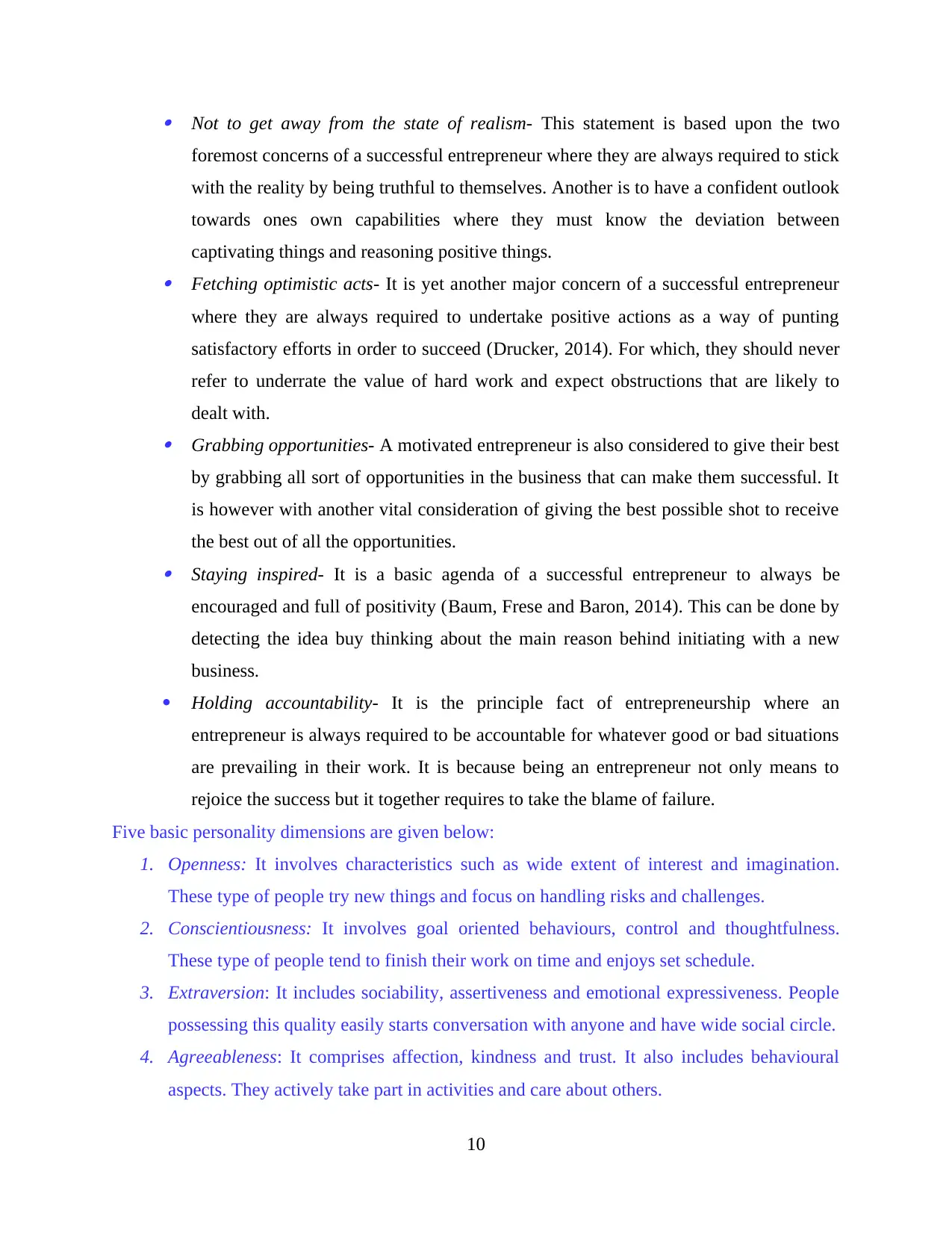
Not to get away from the state of realism- This statement is based upon the two
foremost concerns of a successful entrepreneur where they are always required to stick
with the reality by being truthful to themselves. Another is to have a confident outlook
towards ones own capabilities where they must know the deviation between
captivating things and reasoning positive things.
Fetching optimistic acts- It is yet another major concern of a successful entrepreneur
where they are always required to undertake positive actions as a way of punting
satisfactory efforts in order to succeed (Drucker, 2014). For which, they should never
refer to underrate the value of hard work and expect obstructions that are likely to
dealt with.
Grabbing opportunities- A motivated entrepreneur is also considered to give their best
by grabbing all sort of opportunities in the business that can make them successful. It
is however with another vital consideration of giving the best possible shot to receive
the best out of all the opportunities.
Staying inspired- It is a basic agenda of a successful entrepreneur to always be
encouraged and full of positivity (Baum, Frese and Baron, 2014). This can be done by
detecting the idea buy thinking about the main reason behind initiating with a new
business.
Holding accountability- It is the principle fact of entrepreneurship where an
entrepreneur is always required to be accountable for whatever good or bad situations
are prevailing in their work. It is because being an entrepreneur not only means to
rejoice the success but it together requires to take the blame of failure.
Five basic personality dimensions are given below:
1. Openness: It involves characteristics such as wide extent of interest and imagination.
These type of people try new things and focus on handling risks and challenges.
2. Conscientiousness: It involves goal oriented behaviours, control and thoughtfulness.
These type of people tend to finish their work on time and enjoys set schedule.
3. Extraversion: It includes sociability, assertiveness and emotional expressiveness. People
possessing this quality easily starts conversation with anyone and have wide social circle.
4. Agreeableness: It comprises affection, kindness and trust. It also includes behavioural
aspects. They actively take part in activities and care about others.
10
foremost concerns of a successful entrepreneur where they are always required to stick
with the reality by being truthful to themselves. Another is to have a confident outlook
towards ones own capabilities where they must know the deviation between
captivating things and reasoning positive things.
Fetching optimistic acts- It is yet another major concern of a successful entrepreneur
where they are always required to undertake positive actions as a way of punting
satisfactory efforts in order to succeed (Drucker, 2014). For which, they should never
refer to underrate the value of hard work and expect obstructions that are likely to
dealt with.
Grabbing opportunities- A motivated entrepreneur is also considered to give their best
by grabbing all sort of opportunities in the business that can make them successful. It
is however with another vital consideration of giving the best possible shot to receive
the best out of all the opportunities.
Staying inspired- It is a basic agenda of a successful entrepreneur to always be
encouraged and full of positivity (Baum, Frese and Baron, 2014). This can be done by
detecting the idea buy thinking about the main reason behind initiating with a new
business.
Holding accountability- It is the principle fact of entrepreneurship where an
entrepreneur is always required to be accountable for whatever good or bad situations
are prevailing in their work. It is because being an entrepreneur not only means to
rejoice the success but it together requires to take the blame of failure.
Five basic personality dimensions are given below:
1. Openness: It involves characteristics such as wide extent of interest and imagination.
These type of people try new things and focus on handling risks and challenges.
2. Conscientiousness: It involves goal oriented behaviours, control and thoughtfulness.
These type of people tend to finish their work on time and enjoys set schedule.
3. Extraversion: It includes sociability, assertiveness and emotional expressiveness. People
possessing this quality easily starts conversation with anyone and have wide social circle.
4. Agreeableness: It comprises affection, kindness and trust. It also includes behavioural
aspects. They actively take part in activities and care about others.
10
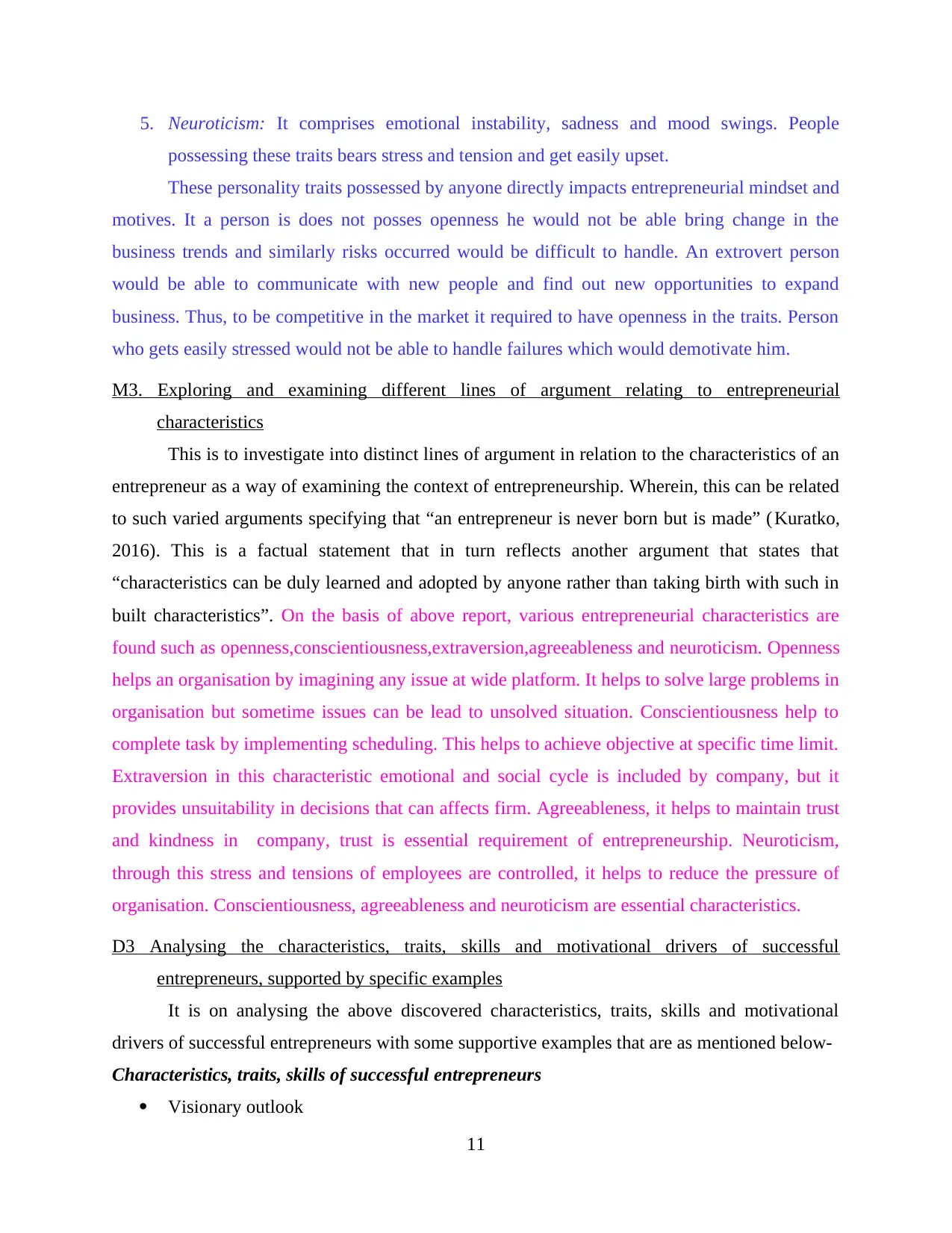
5. Neuroticism: It comprises emotional instability, sadness and mood swings. People
possessing these traits bears stress and tension and get easily upset.
These personality traits possessed by anyone directly impacts entrepreneurial mindset and
motives. It a person is does not posses openness he would not be able bring change in the
business trends and similarly risks occurred would be difficult to handle. An extrovert person
would be able to communicate with new people and find out new opportunities to expand
business. Thus, to be competitive in the market it required to have openness in the traits. Person
who gets easily stressed would not be able to handle failures which would demotivate him.
M3. Exploring and examining different lines of argument relating to entrepreneurial
characteristics
This is to investigate into distinct lines of argument in relation to the characteristics of an
entrepreneur as a way of examining the context of entrepreneurship. Wherein, this can be related
to such varied arguments specifying that “an entrepreneur is never born but is made” ( Kuratko,
2016). This is a factual statement that in turn reflects another argument that states that
“characteristics can be duly learned and adopted by anyone rather than taking birth with such in
built characteristics”. On the basis of above report, various entrepreneurial characteristics are
found such as openness,conscientiousness,extraversion,agreeableness and neuroticism. Openness
helps an organisation by imagining any issue at wide platform. It helps to solve large problems in
organisation but sometime issues can be lead to unsolved situation. Conscientiousness help to
complete task by implementing scheduling. This helps to achieve objective at specific time limit.
Extraversion in this characteristic emotional and social cycle is included by company, but it
provides unsuitability in decisions that can affects firm. Agreeableness, it helps to maintain trust
and kindness in company, trust is essential requirement of entrepreneurship. Neuroticism,
through this stress and tensions of employees are controlled, it helps to reduce the pressure of
organisation. Conscientiousness, agreeableness and neuroticism are essential characteristics.
D3 Analysing the characteristics, traits, skills and motivational drivers of successful
entrepreneurs, supported by specific examples
It is on analysing the above discovered characteristics, traits, skills and motivational
drivers of successful entrepreneurs with some supportive examples that are as mentioned below-
Characteristics, traits, skills of successful entrepreneurs
Visionary outlook
11
possessing these traits bears stress and tension and get easily upset.
These personality traits possessed by anyone directly impacts entrepreneurial mindset and
motives. It a person is does not posses openness he would not be able bring change in the
business trends and similarly risks occurred would be difficult to handle. An extrovert person
would be able to communicate with new people and find out new opportunities to expand
business. Thus, to be competitive in the market it required to have openness in the traits. Person
who gets easily stressed would not be able to handle failures which would demotivate him.
M3. Exploring and examining different lines of argument relating to entrepreneurial
characteristics
This is to investigate into distinct lines of argument in relation to the characteristics of an
entrepreneur as a way of examining the context of entrepreneurship. Wherein, this can be related
to such varied arguments specifying that “an entrepreneur is never born but is made” ( Kuratko,
2016). This is a factual statement that in turn reflects another argument that states that
“characteristics can be duly learned and adopted by anyone rather than taking birth with such in
built characteristics”. On the basis of above report, various entrepreneurial characteristics are
found such as openness,conscientiousness,extraversion,agreeableness and neuroticism. Openness
helps an organisation by imagining any issue at wide platform. It helps to solve large problems in
organisation but sometime issues can be lead to unsolved situation. Conscientiousness help to
complete task by implementing scheduling. This helps to achieve objective at specific time limit.
Extraversion in this characteristic emotional and social cycle is included by company, but it
provides unsuitability in decisions that can affects firm. Agreeableness, it helps to maintain trust
and kindness in company, trust is essential requirement of entrepreneurship. Neuroticism,
through this stress and tensions of employees are controlled, it helps to reduce the pressure of
organisation. Conscientiousness, agreeableness and neuroticism are essential characteristics.
D3 Analysing the characteristics, traits, skills and motivational drivers of successful
entrepreneurs, supported by specific examples
It is on analysing the above discovered characteristics, traits, skills and motivational
drivers of successful entrepreneurs with some supportive examples that are as mentioned below-
Characteristics, traits, skills of successful entrepreneurs
Visionary outlook
11

Risk taking attitude
Original thinkers Competently independent
Motivational drivers of successful entrepreneurs
Wealth is not a major agenda of success
Not to get away from the state of realism
Grabbing opportunities
Holding accountability
All these dimensions can be duly related to a success story of “The Howard Schultz
way”. Wherein, a journey to Milan have given a prompt idea to upmarket espresso cafes all over
Italy to a young seller who was employed in a coffee bean roaster of Seattle (Carland, Carland
and Stewart, 2015). He referred to share this thought with one of his employer who showed no
such interest in implementing his given idea to own such coffee shops but have agreed to
financially support Schultz's attempt. As a result to which, they sold-out their brand name to him
which is entitled as “Starbucks” today and is famously known all over the globe. On the basis of
above report, openness,conscientiousness,extraversion,agreeableness and neuroticism are
characteristics of an organisation. But conscientiousness, agreeableness and neuroticism are
essential characteristics. Along with this entrepreneurship requires various traits for success.
Such as determination, taking risk, confidence and passion. They should have several skills like
investigative, focused, good manager, self-reflection and self-reliance. Various motivational
drivers are also available for successful entrepreneur such as money, flexibility, control,
teamwork and legacy. Mark Zuckerberg is one of the successful entrepreneurship who is
determinant, confident and passionate towards his work. They are able to manage their work
effectively. Always consider any solution after proper investigation. They are able to manage
and control processing of team effectively. They always give preference to passionate employees
into their team.
12
Original thinkers Competently independent
Motivational drivers of successful entrepreneurs
Wealth is not a major agenda of success
Not to get away from the state of realism
Grabbing opportunities
Holding accountability
All these dimensions can be duly related to a success story of “The Howard Schultz
way”. Wherein, a journey to Milan have given a prompt idea to upmarket espresso cafes all over
Italy to a young seller who was employed in a coffee bean roaster of Seattle (Carland, Carland
and Stewart, 2015). He referred to share this thought with one of his employer who showed no
such interest in implementing his given idea to own such coffee shops but have agreed to
financially support Schultz's attempt. As a result to which, they sold-out their brand name to him
which is entitled as “Starbucks” today and is famously known all over the globe. On the basis of
above report, openness,conscientiousness,extraversion,agreeableness and neuroticism are
characteristics of an organisation. But conscientiousness, agreeableness and neuroticism are
essential characteristics. Along with this entrepreneurship requires various traits for success.
Such as determination, taking risk, confidence and passion. They should have several skills like
investigative, focused, good manager, self-reflection and self-reliance. Various motivational
drivers are also available for successful entrepreneur such as money, flexibility, control,
teamwork and legacy. Mark Zuckerberg is one of the successful entrepreneurship who is
determinant, confident and passionate towards his work. They are able to manage their work
effectively. Always consider any solution after proper investigation. They are able to manage
and control processing of team effectively. They always give preference to passionate employees
into their team.
12
Secure Best Marks with AI Grader
Need help grading? Try our AI Grader for instant feedback on your assignments.
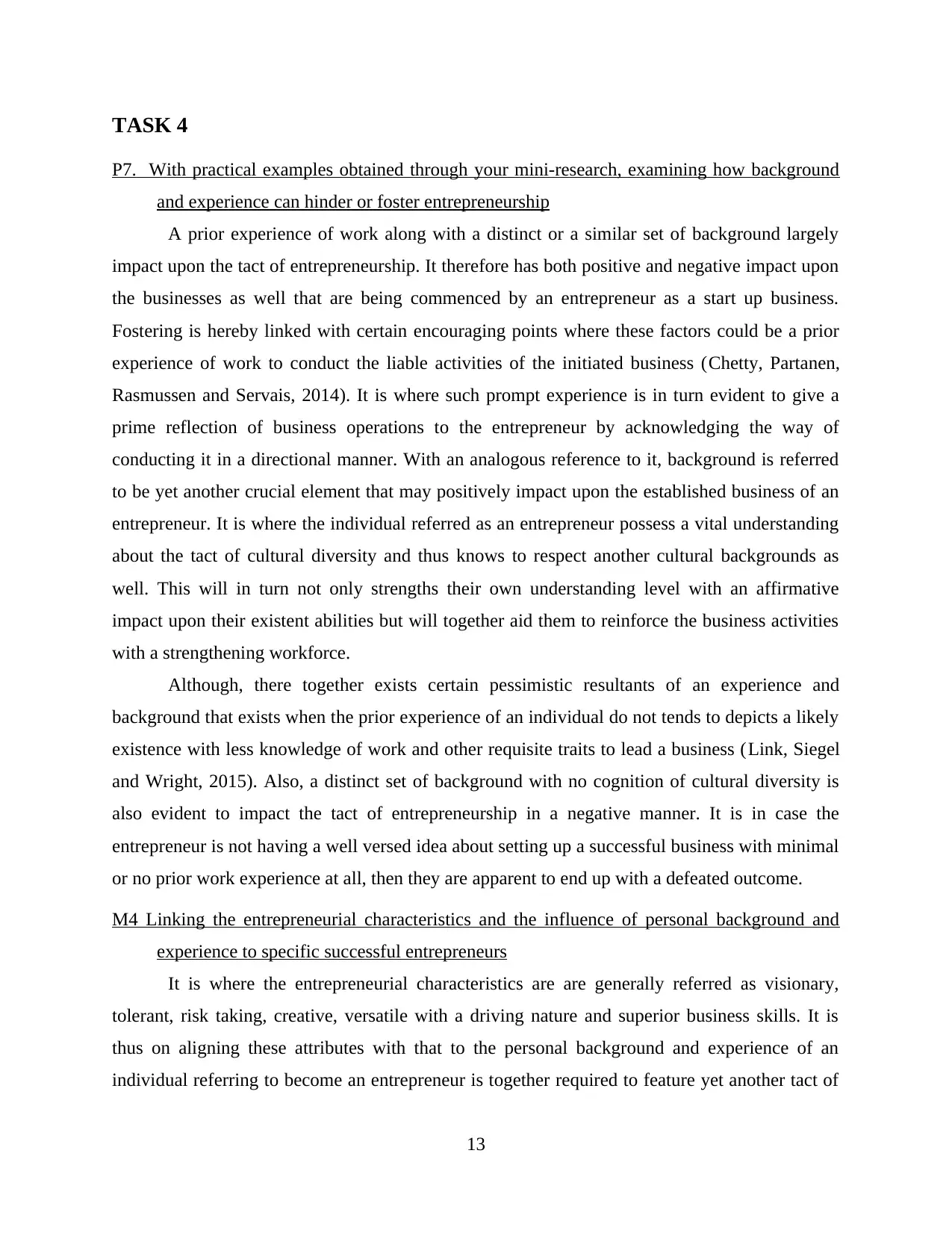
TASK 4
P7. With practical examples obtained through your mini-research, examining how background
and experience can hinder or foster entrepreneurship
A prior experience of work along with a distinct or a similar set of background largely
impact upon the tact of entrepreneurship. It therefore has both positive and negative impact upon
the businesses as well that are being commenced by an entrepreneur as a start up business.
Fostering is hereby linked with certain encouraging points where these factors could be a prior
experience of work to conduct the liable activities of the initiated business (Chetty, Partanen,
Rasmussen and Servais, 2014). It is where such prompt experience is in turn evident to give a
prime reflection of business operations to the entrepreneur by acknowledging the way of
conducting it in a directional manner. With an analogous reference to it, background is referred
to be yet another crucial element that may positively impact upon the established business of an
entrepreneur. It is where the individual referred as an entrepreneur possess a vital understanding
about the tact of cultural diversity and thus knows to respect another cultural backgrounds as
well. This will in turn not only strengths their own understanding level with an affirmative
impact upon their existent abilities but will together aid them to reinforce the business activities
with a strengthening workforce.
Although, there together exists certain pessimistic resultants of an experience and
background that exists when the prior experience of an individual do not tends to depicts a likely
existence with less knowledge of work and other requisite traits to lead a business (Link, Siegel
and Wright, 2015). Also, a distinct set of background with no cognition of cultural diversity is
also evident to impact the tact of entrepreneurship in a negative manner. It is in case the
entrepreneur is not having a well versed idea about setting up a successful business with minimal
or no prior work experience at all, then they are apparent to end up with a defeated outcome.
M4 Linking the entrepreneurial characteristics and the influence of personal background and
experience to specific successful entrepreneurs
It is where the entrepreneurial characteristics are are generally referred as visionary,
tolerant, risk taking, creative, versatile with a driving nature and superior business skills. It is
thus on aligning these attributes with that to the personal background and experience of an
individual referring to become an entrepreneur is together required to feature yet another tact of
13
P7. With practical examples obtained through your mini-research, examining how background
and experience can hinder or foster entrepreneurship
A prior experience of work along with a distinct or a similar set of background largely
impact upon the tact of entrepreneurship. It therefore has both positive and negative impact upon
the businesses as well that are being commenced by an entrepreneur as a start up business.
Fostering is hereby linked with certain encouraging points where these factors could be a prior
experience of work to conduct the liable activities of the initiated business (Chetty, Partanen,
Rasmussen and Servais, 2014). It is where such prompt experience is in turn evident to give a
prime reflection of business operations to the entrepreneur by acknowledging the way of
conducting it in a directional manner. With an analogous reference to it, background is referred
to be yet another crucial element that may positively impact upon the established business of an
entrepreneur. It is where the individual referred as an entrepreneur possess a vital understanding
about the tact of cultural diversity and thus knows to respect another cultural backgrounds as
well. This will in turn not only strengths their own understanding level with an affirmative
impact upon their existent abilities but will together aid them to reinforce the business activities
with a strengthening workforce.
Although, there together exists certain pessimistic resultants of an experience and
background that exists when the prior experience of an individual do not tends to depicts a likely
existence with less knowledge of work and other requisite traits to lead a business (Link, Siegel
and Wright, 2015). Also, a distinct set of background with no cognition of cultural diversity is
also evident to impact the tact of entrepreneurship in a negative manner. It is in case the
entrepreneur is not having a well versed idea about setting up a successful business with minimal
or no prior work experience at all, then they are apparent to end up with a defeated outcome.
M4 Linking the entrepreneurial characteristics and the influence of personal background and
experience to specific successful entrepreneurs
It is where the entrepreneurial characteristics are are generally referred as visionary,
tolerant, risk taking, creative, versatile with a driving nature and superior business skills. It is
thus on aligning these attributes with that to the personal background and experience of an
individual referring to become an entrepreneur is together required to feature yet another tact of
13
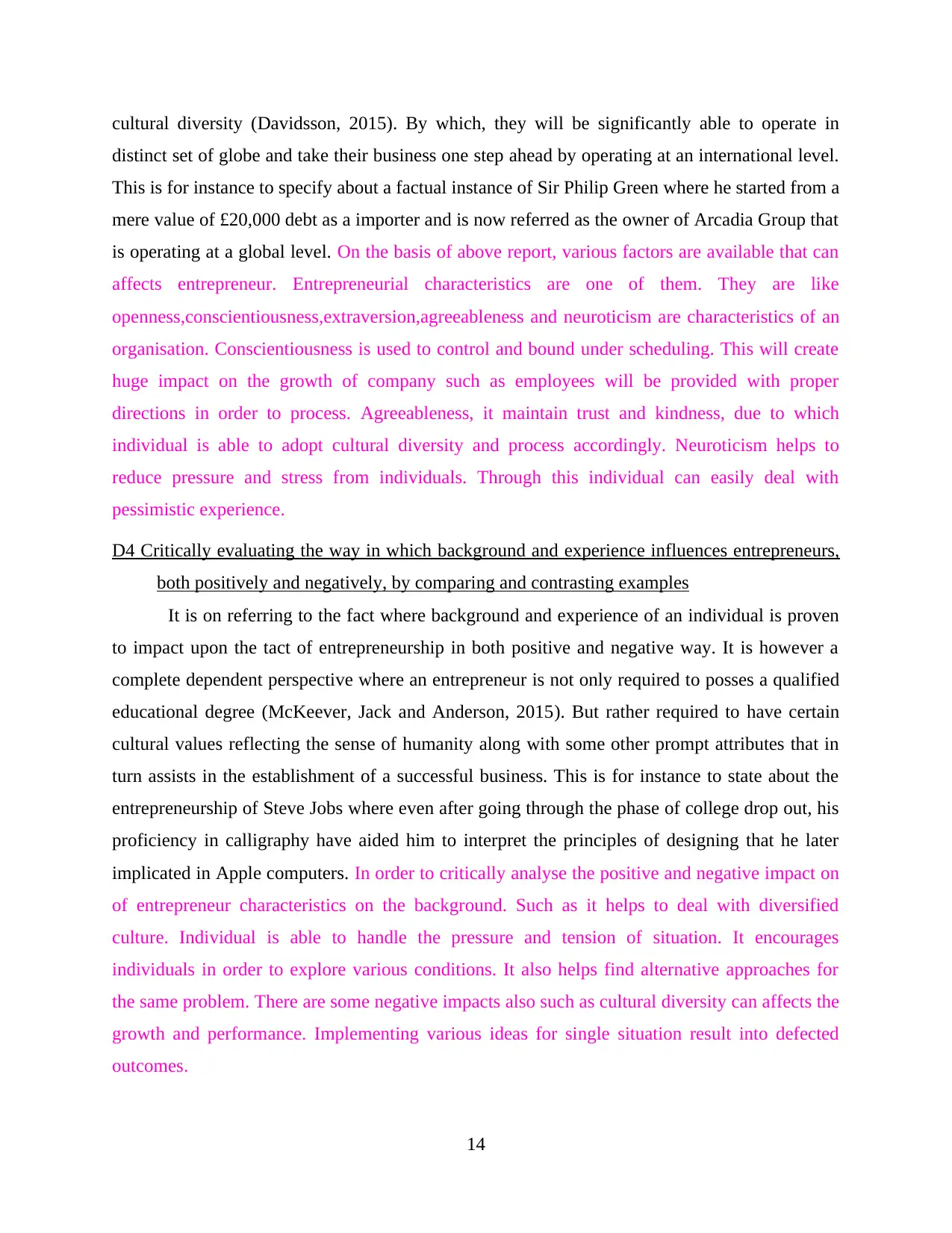
cultural diversity (Davidsson, 2015). By which, they will be significantly able to operate in
distinct set of globe and take their business one step ahead by operating at an international level.
This is for instance to specify about a factual instance of Sir Philip Green where he started from a
mere value of £20,000 debt as a importer and is now referred as the owner of Arcadia Group that
is operating at a global level. On the basis of above report, various factors are available that can
affects entrepreneur. Entrepreneurial characteristics are one of them. They are like
openness,conscientiousness,extraversion,agreeableness and neuroticism are characteristics of an
organisation. Conscientiousness is used to control and bound under scheduling. This will create
huge impact on the growth of company such as employees will be provided with proper
directions in order to process. Agreeableness, it maintain trust and kindness, due to which
individual is able to adopt cultural diversity and process accordingly. Neuroticism helps to
reduce pressure and stress from individuals. Through this individual can easily deal with
pessimistic experience.
D4 Critically evaluating the way in which background and experience influences entrepreneurs,
both positively and negatively, by comparing and contrasting examples
It is on referring to the fact where background and experience of an individual is proven
to impact upon the tact of entrepreneurship in both positive and negative way. It is however a
complete dependent perspective where an entrepreneur is not only required to posses a qualified
educational degree (McKeever, Jack and Anderson, 2015). But rather required to have certain
cultural values reflecting the sense of humanity along with some other prompt attributes that in
turn assists in the establishment of a successful business. This is for instance to state about the
entrepreneurship of Steve Jobs where even after going through the phase of college drop out, his
proficiency in calligraphy have aided him to interpret the principles of designing that he later
implicated in Apple computers. In order to critically analyse the positive and negative impact on
of entrepreneur characteristics on the background. Such as it helps to deal with diversified
culture. Individual is able to handle the pressure and tension of situation. It encourages
individuals in order to explore various conditions. It also helps find alternative approaches for
the same problem. There are some negative impacts also such as cultural diversity can affects the
growth and performance. Implementing various ideas for single situation result into defected
outcomes.
14
distinct set of globe and take their business one step ahead by operating at an international level.
This is for instance to specify about a factual instance of Sir Philip Green where he started from a
mere value of £20,000 debt as a importer and is now referred as the owner of Arcadia Group that
is operating at a global level. On the basis of above report, various factors are available that can
affects entrepreneur. Entrepreneurial characteristics are one of them. They are like
openness,conscientiousness,extraversion,agreeableness and neuroticism are characteristics of an
organisation. Conscientiousness is used to control and bound under scheduling. This will create
huge impact on the growth of company such as employees will be provided with proper
directions in order to process. Agreeableness, it maintain trust and kindness, due to which
individual is able to adopt cultural diversity and process accordingly. Neuroticism helps to
reduce pressure and stress from individuals. Through this individual can easily deal with
pessimistic experience.
D4 Critically evaluating the way in which background and experience influences entrepreneurs,
both positively and negatively, by comparing and contrasting examples
It is on referring to the fact where background and experience of an individual is proven
to impact upon the tact of entrepreneurship in both positive and negative way. It is however a
complete dependent perspective where an entrepreneur is not only required to posses a qualified
educational degree (McKeever, Jack and Anderson, 2015). But rather required to have certain
cultural values reflecting the sense of humanity along with some other prompt attributes that in
turn assists in the establishment of a successful business. This is for instance to state about the
entrepreneurship of Steve Jobs where even after going through the phase of college drop out, his
proficiency in calligraphy have aided him to interpret the principles of designing that he later
implicated in Apple computers. In order to critically analyse the positive and negative impact on
of entrepreneur characteristics on the background. Such as it helps to deal with diversified
culture. Individual is able to handle the pressure and tension of situation. It encourages
individuals in order to explore various conditions. It also helps find alternative approaches for
the same problem. There are some negative impacts also such as cultural diversity can affects the
growth and performance. Implementing various ideas for single situation result into defected
outcomes.
14
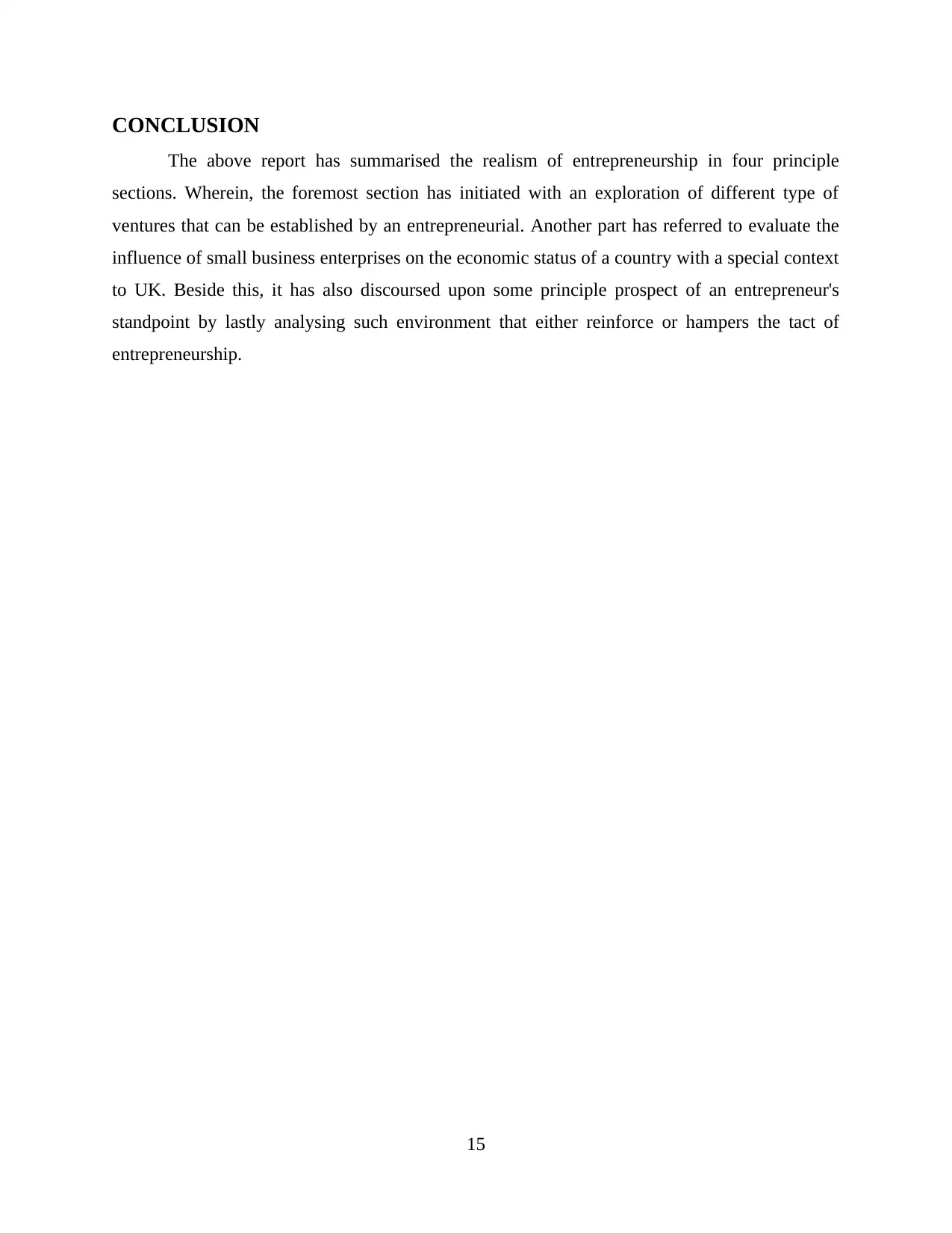
CONCLUSION
The above report has summarised the realism of entrepreneurship in four principle
sections. Wherein, the foremost section has initiated with an exploration of different type of
ventures that can be established by an entrepreneurial. Another part has referred to evaluate the
influence of small business enterprises on the economic status of a country with a special context
to UK. Beside this, it has also discoursed upon some principle prospect of an entrepreneur's
standpoint by lastly analysing such environment that either reinforce or hampers the tact of
entrepreneurship.
15
The above report has summarised the realism of entrepreneurship in four principle
sections. Wherein, the foremost section has initiated with an exploration of different type of
ventures that can be established by an entrepreneurial. Another part has referred to evaluate the
influence of small business enterprises on the economic status of a country with a special context
to UK. Beside this, it has also discoursed upon some principle prospect of an entrepreneur's
standpoint by lastly analysing such environment that either reinforce or hampers the tact of
entrepreneurship.
15
Paraphrase This Document
Need a fresh take? Get an instant paraphrase of this document with our AI Paraphraser
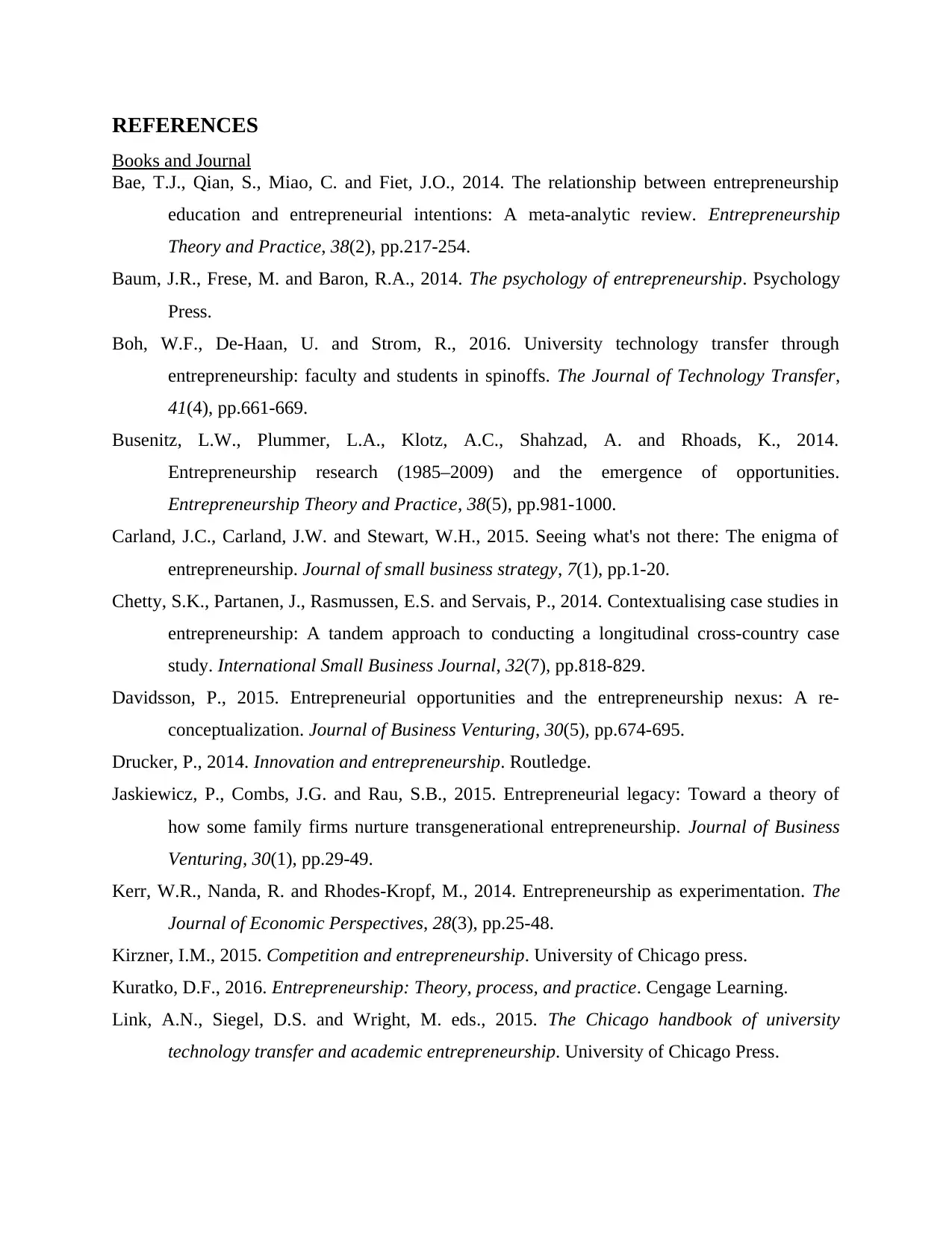
REFERENCES
Books and Journal
Bae, T.J., Qian, S., Miao, C. and Fiet, J.O., 2014. The relationship between entrepreneurship
education and entrepreneurial intentions: A meta‐analytic review. Entrepreneurship
Theory and Practice, 38(2), pp.217-254.
Baum, J.R., Frese, M. and Baron, R.A., 2014. The psychology of entrepreneurship. Psychology
Press.
Boh, W.F., De-Haan, U. and Strom, R., 2016. University technology transfer through
entrepreneurship: faculty and students in spinoffs. The Journal of Technology Transfer,
41(4), pp.661-669.
Busenitz, L.W., Plummer, L.A., Klotz, A.C., Shahzad, A. and Rhoads, K., 2014.
Entrepreneurship research (1985–2009) and the emergence of opportunities.
Entrepreneurship Theory and Practice, 38(5), pp.981-1000.
Carland, J.C., Carland, J.W. and Stewart, W.H., 2015. Seeing what's not there: The enigma of
entrepreneurship. Journal of small business strategy, 7(1), pp.1-20.
Chetty, S.K., Partanen, J., Rasmussen, E.S. and Servais, P., 2014. Contextualising case studies in
entrepreneurship: A tandem approach to conducting a longitudinal cross-country case
study. International Small Business Journal, 32(7), pp.818-829.
Davidsson, P., 2015. Entrepreneurial opportunities and the entrepreneurship nexus: A re-
conceptualization. Journal of Business Venturing, 30(5), pp.674-695.
Drucker, P., 2014. Innovation and entrepreneurship. Routledge.
Jaskiewicz, P., Combs, J.G. and Rau, S.B., 2015. Entrepreneurial legacy: Toward a theory of
how some family firms nurture transgenerational entrepreneurship. Journal of Business
Venturing, 30(1), pp.29-49.
Kerr, W.R., Nanda, R. and Rhodes-Kropf, M., 2014. Entrepreneurship as experimentation. The
Journal of Economic Perspectives, 28(3), pp.25-48.
Kirzner, I.M., 2015. Competition and entrepreneurship. University of Chicago press.
Kuratko, D.F., 2016. Entrepreneurship: Theory, process, and practice. Cengage Learning.
Link, A.N., Siegel, D.S. and Wright, M. eds., 2015. The Chicago handbook of university
technology transfer and academic entrepreneurship. University of Chicago Press.
Books and Journal
Bae, T.J., Qian, S., Miao, C. and Fiet, J.O., 2014. The relationship between entrepreneurship
education and entrepreneurial intentions: A meta‐analytic review. Entrepreneurship
Theory and Practice, 38(2), pp.217-254.
Baum, J.R., Frese, M. and Baron, R.A., 2014. The psychology of entrepreneurship. Psychology
Press.
Boh, W.F., De-Haan, U. and Strom, R., 2016. University technology transfer through
entrepreneurship: faculty and students in spinoffs. The Journal of Technology Transfer,
41(4), pp.661-669.
Busenitz, L.W., Plummer, L.A., Klotz, A.C., Shahzad, A. and Rhoads, K., 2014.
Entrepreneurship research (1985–2009) and the emergence of opportunities.
Entrepreneurship Theory and Practice, 38(5), pp.981-1000.
Carland, J.C., Carland, J.W. and Stewart, W.H., 2015. Seeing what's not there: The enigma of
entrepreneurship. Journal of small business strategy, 7(1), pp.1-20.
Chetty, S.K., Partanen, J., Rasmussen, E.S. and Servais, P., 2014. Contextualising case studies in
entrepreneurship: A tandem approach to conducting a longitudinal cross-country case
study. International Small Business Journal, 32(7), pp.818-829.
Davidsson, P., 2015. Entrepreneurial opportunities and the entrepreneurship nexus: A re-
conceptualization. Journal of Business Venturing, 30(5), pp.674-695.
Drucker, P., 2014. Innovation and entrepreneurship. Routledge.
Jaskiewicz, P., Combs, J.G. and Rau, S.B., 2015. Entrepreneurial legacy: Toward a theory of
how some family firms nurture transgenerational entrepreneurship. Journal of Business
Venturing, 30(1), pp.29-49.
Kerr, W.R., Nanda, R. and Rhodes-Kropf, M., 2014. Entrepreneurship as experimentation. The
Journal of Economic Perspectives, 28(3), pp.25-48.
Kirzner, I.M., 2015. Competition and entrepreneurship. University of Chicago press.
Kuratko, D.F., 2016. Entrepreneurship: Theory, process, and practice. Cengage Learning.
Link, A.N., Siegel, D.S. and Wright, M. eds., 2015. The Chicago handbook of university
technology transfer and academic entrepreneurship. University of Chicago Press.
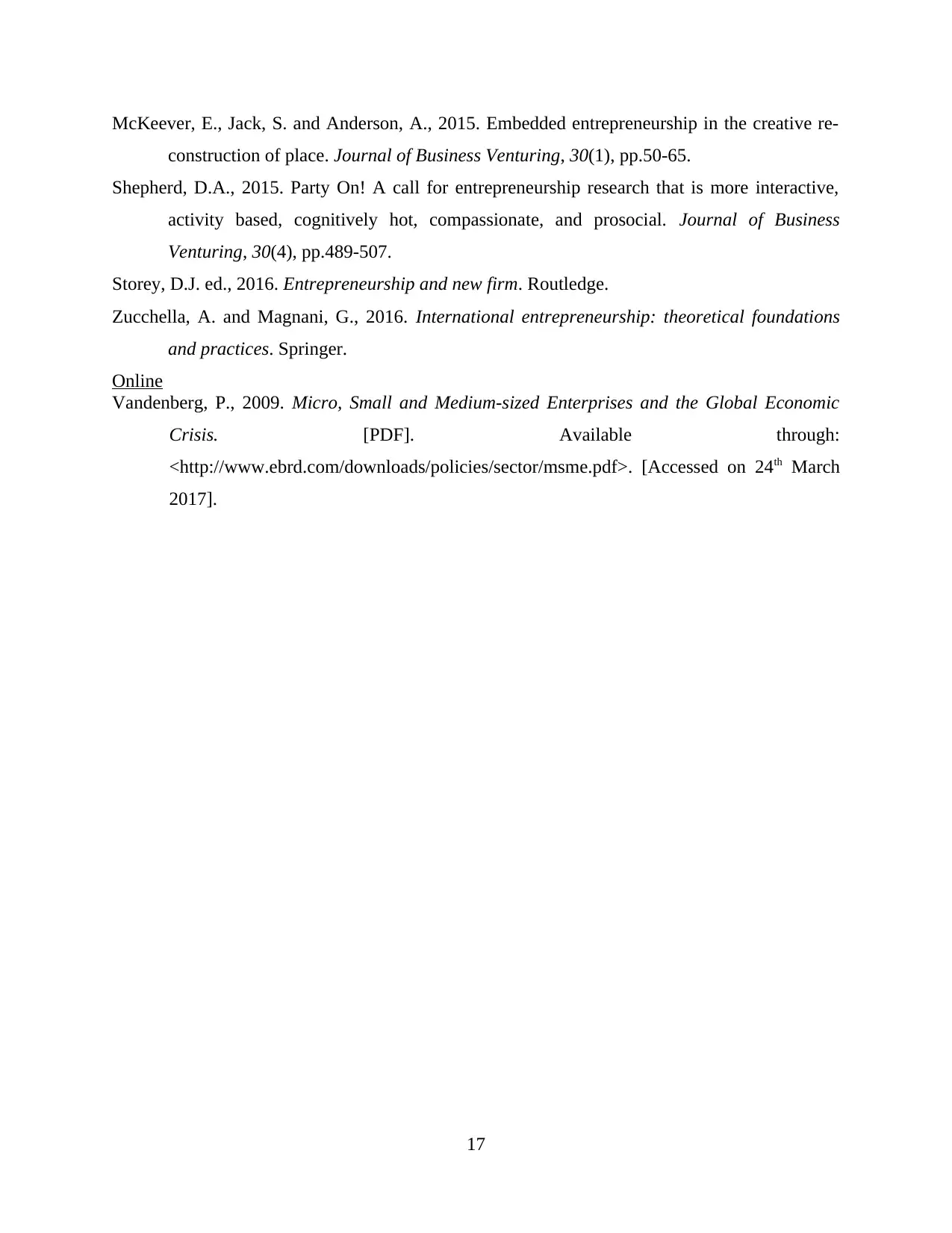
McKeever, E., Jack, S. and Anderson, A., 2015. Embedded entrepreneurship in the creative re-
construction of place. Journal of Business Venturing, 30(1), pp.50-65.
Shepherd, D.A., 2015. Party On! A call for entrepreneurship research that is more interactive,
activity based, cognitively hot, compassionate, and prosocial. Journal of Business
Venturing, 30(4), pp.489-507.
Storey, D.J. ed., 2016. Entrepreneurship and new firm. Routledge.
Zucchella, A. and Magnani, G., 2016. International entrepreneurship: theoretical foundations
and practices. Springer.
Online
Vandenberg, P., 2009. Micro, Small and Medium-sized Enterprises and the Global Economic
Crisis. [PDF]. Available through:
<http://www.ebrd.com/downloads/policies/sector/msme.pdf>. [Accessed on 24th March
2017].
17
construction of place. Journal of Business Venturing, 30(1), pp.50-65.
Shepherd, D.A., 2015. Party On! A call for entrepreneurship research that is more interactive,
activity based, cognitively hot, compassionate, and prosocial. Journal of Business
Venturing, 30(4), pp.489-507.
Storey, D.J. ed., 2016. Entrepreneurship and new firm. Routledge.
Zucchella, A. and Magnani, G., 2016. International entrepreneurship: theoretical foundations
and practices. Springer.
Online
Vandenberg, P., 2009. Micro, Small and Medium-sized Enterprises and the Global Economic
Crisis. [PDF]. Available through:
<http://www.ebrd.com/downloads/policies/sector/msme.pdf>. [Accessed on 24th March
2017].
17
1 out of 21
Related Documents
Your All-in-One AI-Powered Toolkit for Academic Success.
+13062052269
info@desklib.com
Available 24*7 on WhatsApp / Email
![[object Object]](/_next/static/media/star-bottom.7253800d.svg)
Unlock your academic potential
© 2024 | Zucol Services PVT LTD | All rights reserved.





